|
June 1, 2019 - No. 20
Alberta
Government's Assault on the Polity
a Matter of Concern for all Canadians

Alberta Government's Assault on the
Polity
• Throne
Speech Proclaims Alberta "Open for Business"
- Peggy Morton -
• Legislative
Agenda of the Kenney Government
• Illegal
Request to Put Arbitration of Wage Re-Openers on Hold
• Provincial
Government Announces "Cutbacks and Wage Restraint"
for All Public
Sector Workers
• Comment on
the Public Sector and Its Crucial Role in the Economy
- K.C. Adams -
For Nation-to-Nation Relations and an
End to Genocide
of Indigenous Peoples
• Day of
Action Defends Indigenous Rights
• BC Court of
Appeal Ruling Means British Columbians and
Indigenous Nations
Remain Vulnerable to Oil Spills
Contention Over the Arctic
• Canada
Files
Submission on Arctic Ocean Continental Shelf
- Peter Ewart -
Canada-Cuba Relations
• Parliament
Hosts Symposium on Cuba
• Pickets in
Ottawa and Montreal Continue to Demand Provision of Canadian
Consular Services in Cuba
• Open
Letter
to Prime Minister Trudeau Concerning Visas for Latin American and
Caribbean Scholars
- Canadian Association of Latin
American and Caribbean Studies -
• Canadians
Take Part in Annual Caravan to Overcome U.S.
Unjust Blockade of
Cuba
• Toronto Coming Event: Cuba
in the Time of Trump
Opposition to New Attempts to Impose
U.S. Dictate
• Caribbean
Community Must Unify to Resist Imposition of
Secretary-General of
Organization of American States
- Sir Ronald Sanders -
Trump Administration's Deal of the
Century
• Resurrecting
the
PLO
Is
Palestine's
Best
Response
- Ramzy Baroud -
35th Anniversary of Operation Blue
Star
• Heinous
Crime of the Indian Ruling Class Against the
Peoples of Punjab
and All of India
75th Anniversary of D-Day
• Deepest
Respects to All Who Contributed to the Defeat
of the Nazis in
World War II
• Normandy
Landing and the Re-Writing of History
- François Lazure -
Supplement
Ontario
• One Year of
Resistance to Escalating Anti-Social Offensive
- Photo Review -
Alberta Government's Assault on the Polity
- Peggy Morton -
 The spring session of the
Alberta Legislature began May 22 with the
Speech from the Throne delivered by Lieutenant-Governor Lois Mitchell.
Based on the usual claim that the people have spoken and the government
now has a mandate to pay the rich and impose its anti-social agenda,
the Throne Speech declared the election "reflects a
movement towards democratic and economic renewal." The spring session of the
Alberta Legislature began May 22 with the
Speech from the Throne delivered by Lieutenant-Governor Lois Mitchell.
Based on the usual claim that the people have spoken and the government
now has a mandate to pay the rich and impose its anti-social agenda,
the Throne Speech declared the election "reflects a
movement towards democratic and economic renewal."
It is indeed true that the people of Alberta want
democratic and
economic renewal. It is their greatest need and desire. But what Jason
Kenney is doing will not satisfy this want. It will in fact resolve
none of the problems facing the economy and polity in Alberta and only
make matters worse. At present, the polity plays no role in deciding
the
policies of the cartel parties and their candidates contending for
power in Alberta or elsewhere in Canada. Democratic and economic
renewal for working people is their striving for political empowerment
and the power to change the direction of the economy. The changing of
the cartel party in power in Alberta continues the dominance, class
privilege and regime of the financial oligarchy and has nothing to do
with renewal.
Kenney's seizure of power of the Progressive
Conservative Party in Alberta and formation of the United Conservative
Party was a coup by the Harperites centred in Calgary to regain control
of the province from the Wildrose conservatives in the rural areas and
the NDPers centred in Edmonton. The regime change consolidates and
continues the rule of the financial oligarchy to pay the rich and the
previous government's campaign to allow global private interests to
exploit the natural resources without restriction while intensifying
the dog-fight amongst competing sections of the ruling circles. The
anti-social offensive, the attacks and the disinvestment in social
programs continue, including an open assault on the public education
and health care systems and measures to make life more difficult for
the working class and its organizations.
The Throne Speech paints a picture of an Alberta "beset
by severe external political and economic constraints, and consequently
saddled with serious internal fiscal challenges requiring urgent
action." By describing these "severe external political and economic
constraints," the Throne Speech does not analyze the actual material
conditions of Alberta, Canada or the world. The "serious internal
fiscal challenges" previously blamed on the NDP government are
now portrayed as "external political and economic constraints." In
other words, now Alberta is said to be the victim not only of economic
forces beyond its control but a conspiracy to "landlock its oil." This
self-serving view, largely shared by the Notley NDP government when in
power, positions Albertans to take sides in the vicious inter-monopoly
fight that fraudulently pits the natural environment against the
economy and divides Canadians on an irrational basis.
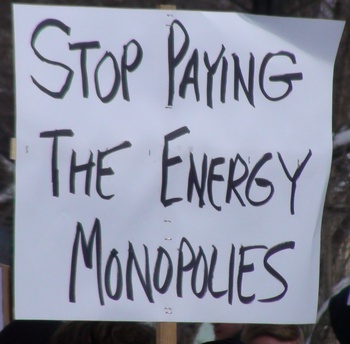 The resurrection of the
slogan "Open for Business" can hardly be called renewal. It has been
dragged from the pit of disgrace that was the Mike Harris anti-social
offensive in Ontario in the 1990s, and copied by the Ford government in
Ontario, the Legault government in Quebec and now Kenney in Alberta. The resurrection of the
slogan "Open for Business" can hardly be called renewal. It has been
dragged from the pit of disgrace that was the Mike Harris anti-social
offensive in Ontario in the 1990s, and copied by the Ford government in
Ontario, the Legault government in Quebec and now Kenney in Alberta.
The Throne Speech promises to "create jobs, growth, and
economic
diversification" and "show the world that we are open for business to
restore investor confidence, while carefully restoring balance to our
province's finances." Is Kenney serious? What can he do when a global
financial oligarchy owns and controls the main sectors of the
Alberta economy and his government has no intention to change these
arrangements? The recurring economic crises reflect that global
dominance and how little, if any, power the Alberta Legislature or
Alberta's cartel parties have over the situation within the U.S.-led
imperialist system of states.
The Kenney government's anti-social legislative agenda
reduces the minimum wage for youth from $15 to $13 an hour. It targets
the public system of education and health care and social programs for
further privatization and destruction. It will further eliminate
regulations that restrict those it calls "the job creators." That is
what Kenney calls job creation and economic renewal. The heavy burden
of $2 an hour, the social programs, regulations and red tape are lifted
from the backs of the rich oligarchs who in turn toast Alberta being
"open for business."
For the state to serve private interests and provide
everything the financial oligarchy needs to pursue its plunder of the
natural resources and expropriation of the value workers produce is
reckless and contributes nothing to solving the problems of either the
economy or the democracy. Economic renewal for Kenney and his ilk means
rejecting any consideration of the consequences of economic activity
except the only one that matters -- the rate of profit on invested
private wealth. Nothing must interfere with the motive of production of
imperialism, which is the greatest profit in the fastest time.
What democratic renewal can working people expect from
the gods of plague when even the labour laws are stacked against the
workers to keep them from forming defence organizations at the
workplace? In the construction sector the law permits "double
breasting," where companies can transfer work to their non-union arm,
and where laws favour the recognition of the business-led Christian
Labour Association of Canada, as well as other tricks to deprive
workers of the right to organize collectively. Under the previous
government, while boasting of tweaking labour laws in favour of the
working class, not a single workplace has been able to negotiate an
essential services agreement without which strikes are illegal.

"Unstack the Deck" rally in Edmonton, April 30, 2017, demanded an end
to the practice of
"double breasting" in the construction industry.
For the Kenney government, democratic renewal for
workers means treating them like consumers who have choices -- whether
to belong to a union or not, whether to pay union dues or not, which
cartel party to vote for. And everyone knows what those choices mean in
a country where anti-union propaganda is rife and the workers are
blamed for all the ills of the economy because their choices interfere
with the striving of the rich to increase their profits no matter what
the consequences for the social and natural environments.
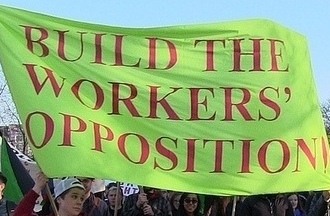 The cartel parties and
governments are put into power and removed
at the bidding of the financial oligarchy, so any talk of democratic
renewal has to begin somewhere other than in their backrooms and press
releases. The working people themselves have to gain power through
their own efforts and organizing, through their own empowerment
and speaking for themselves. Only then can they experience genuine
democratic renewal and march out on a path of economic renewal with a
new motive of production that guarantees the well-being and rights of
the people as a first priority and strives to humanize the social and
natural environment. The cartel parties and
governments are put into power and removed
at the bidding of the financial oligarchy, so any talk of democratic
renewal has to begin somewhere other than in their backrooms and press
releases. The working people themselves have to gain power through
their own efforts and organizing, through their own empowerment
and speaking for themselves. Only then can they experience genuine
democratic renewal and march out on a path of economic renewal with a
new motive of production that guarantees the well-being and rights of
the people as a first priority and strives to humanize the social and
natural environment.


Youth in Calgary participate in climate strike actions, March 15,
2019, demanding that governments take measures to protect the natural
environment and their future.
Making Alberta workers and resources
open for
private profit
of the financial oligarchy
The Kenney Conservative government in Alberta began to
lay out
its legislative agenda for the spring and fall sessions with its
May 22 Throne Speech, making clear it will intensify the
neo-liberal anti-social offensive. Four bills followed in short
order.
Bill 1, the Carbon
Tax Repeal Act
Bill
1, introduced May 22, will eliminate the Alberta carbon tax. In doing
so, Kenney
promises a court challenge to the federal carbon tax, which the
Trudeau government is expected to apply to Alberta immediately
following the repeal of the provincial tax.
Kenney vows to launch a constitutional challenge despite
the
ruling from the Saskatchewan Court of Appeal upholding the
federal government's right to impose such a tax. This indicates
the increasing hostility and animosity among competing sectors of
the ruling elite, which with Kenney at the helm in Alberta can
only grow more rancorous.
Bill 2, an Act to
Make Alberta Open for Business
Bill 2, tabled on May 27, reduces the minimum wage for
young
workers from $15 to $13 an hour. The bill cynically calls this
reduction in wages something that promotes job creation for young
workers.
The bill also reverses legislation from the previous NDP
government providing for automatic certification of a union when
65 per cent of workers in a workplace sign union cards. On this
issue, the Throne Speech suggests that more will be coming,
continuing the project of the former federal Harper government to
obstruct the right of workers to organize effectively in their
defence collectives. Expected as well is legal permission for
employers to pay out all banked overtime hours as straight
time.
Bill 3, the Job
Creation Tax Cut Act
 Introduced the following
day, May 28, Bill 3 reduces the nominal
corporate tax rate on net enterprise profit from 12 per cent to 8
per cent, becoming the lowest provincial rate in Canada. Introduced the following
day, May 28, Bill 3 reduces the nominal
corporate tax rate on net enterprise profit from 12 per cent to 8
per cent, becoming the lowest provincial rate in Canada.
Corporate income tax at 12 per cent provided only a
small
fraction of the total revenue collected by the Alberta
government. In 2017-2018, total government revenue was $47.295
billion, with only $3.448 billion coming from corporate income
taxes or about 7.2 per cent of the total budget. Assuming the
reduced rate of 8 per cent had been applied in that fiscal year,
this would have resulted in about $1.138 billion less collected
for a total of $46.157 billion. The corporate income tax revenue
of only $2.310 billion would have been just 5 per cent of the
total provincial revenue collected.
The Throne Speech postulates the reduced corporate tax
on net
enterprise profit will "generate 55,000 new full time jobs, and
increase the size of our economy by $12.7 billion." How this
rabbit will be pulled out of the hat is, one can assume, a
mystery of imperialist economics. However, making up for this
lost revenue is no mystery as it will come out of lower
investments in social programs and attacks on the wages and
working conditions of workers in the public sector and job
cuts.
Bill 4, the Red Tape
Reduction Act
In rapid succession the next day, May 29, Bill 4 was
introduced.
The
government wants this bill to speed up approval of resource
projects, reduce the cost to corporations seeking regulatory
approval, and generally provide a free hand for the monopolies to
do whatever they please without restrictions on their actions
regardless of the social and natural consequences.
Many would say this is a recipe for disaster given the
reality
that making as much money as fast as possible is the motive and modus operandi of
companies within the imperialist economy. The
profit motive leads big companies routinely to ignore their
social responsibilities. This often results in reckless
adventures and disasters -- such as the 300,000 orphaned oil and gas
wells in Alberta, along with abandoned mining sites and polluted
air, water and soil -- for which no company wants to be accountable,
as that would damage the bottom line.
Additional Legislation
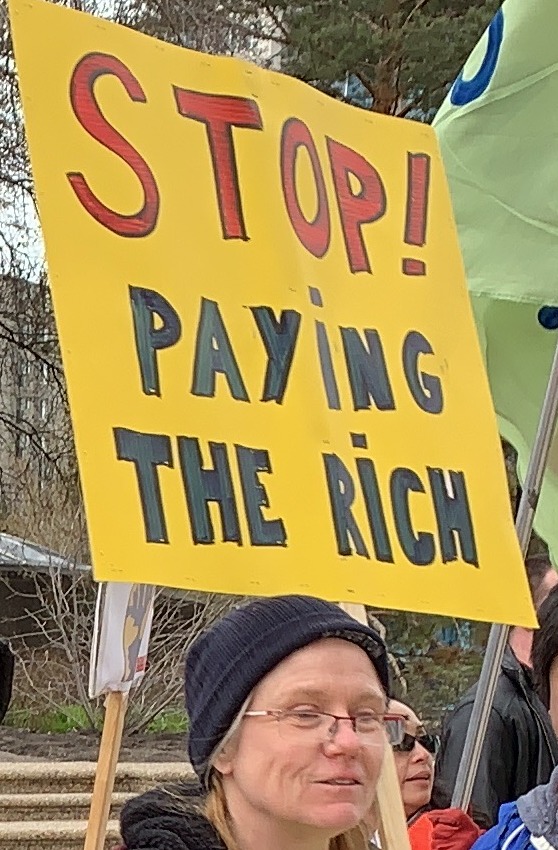 Another bill, the Appropriation
Act
will provide interim estimates
for public services, to be followed by a full budget in the fall
sitting. The Throne Speech states, "That Budget will be informed
by the report of the Fiscal Review Panel chaired by former
Saskatchewan Finance Minister Janice MacKinnon, which will make
recommendations on how to restore balance to our province's
finances so that we stop encumbering future generations with
debt. My government will also engage in widespread public
consultations on how best to end deficit spending while
protecting front line public services." Another bill, the Appropriation
Act
will provide interim estimates
for public services, to be followed by a full budget in the fall
sitting. The Throne Speech states, "That Budget will be informed
by the report of the Fiscal Review Panel chaired by former
Saskatchewan Finance Minister Janice MacKinnon, which will make
recommendations on how to restore balance to our province's
finances so that we stop encumbering future generations with
debt. My government will also engage in widespread public
consultations on how best to end deficit spending while
protecting front line public services."
Government deficit spending and debts are integral to
the
imperialist economy. For the cartel parties to use their
existence as an excuse not to fulfil their social
responsibilities exposes their role as toadies of the financial
oligarchy and unfit to govern. The cartel parties block the
working people from finding, proposing and implementing a
pro-social direction for the economy that would guarantee the
well-being and rights of the people, humanize the social and
natural environment and eliminate the destructive class privilege
of the rich oligarchs.
Also announced are the Tax Statutes Amendment Act
that
is expected to revert to a flat tax regime for personal income
tax, which entrenches its regressive nature; and the Royalties
Guarantee Act to "provide certainty that the royalty structure
in
place when a well is drilled remains in place for the life of the
well."
The Choice in Education Act will restore and
expand
"the choices available to parents and children," which is code
for continued privatization of education, as well as an attempt
to attack the right of students to privacy and the responsibility
of teachers to respect that privacy.
Perhaps the most cynical claim of all is the promise to
enact the Saving the Girl Next Door
Act, which would introduce measures against human trafficking.
This comes from Jason Kenney who as federal Minister of Immigration
during the Harper regime launched particularly vicious assaults on
migrant workers, including live-in caregivers and temporary foreign
workers. Such treatment of these workers by Canadian governments is
considered by many as tantamount to human trafficking.
The Throne Speech repeated the Kenney government's
assertion
to repeal the Carbon Competitiveness Incentive Regulation and
replace it with a Technology Innovation and Emissions Reduction
Fund to "ensure investment in new emissions-reducing technologies
which can be exported around the world."
 The previous NDP government
provided extensive pay-the-rich
schemes to the energy cartels for "emissions reduction
technology." Oil sands companies are eager to introduce such
technology, as it reduces fuel use and therefore the price of
production of their commodities. They also want to be paid from
the public treasury to do what is in their self-interest and to
attract global investors. Kenney's pledge to reduce emissions
should be considered within the context of a pulling back by certain
sections of the financial oligarchy from investment in carbon
products and their use, and the growth of private investment and
public pay-the-rich schemes in green energy and related actions,
such as carbon capture. The previous NDP government
provided extensive pay-the-rich
schemes to the energy cartels for "emissions reduction
technology." Oil sands companies are eager to introduce such
technology, as it reduces fuel use and therefore the price of
production of their commodities. They also want to be paid from
the public treasury to do what is in their self-interest and to
attract global investors. Kenney's pledge to reduce emissions
should be considered within the context of a pulling back by certain
sections of the financial oligarchy from investment in carbon
products and their use, and the growth of private investment and
public pay-the-rich schemes in green energy and related actions,
such as carbon capture.
The Kenney government also proclaimed the Preserving
Canada's
Economic
Prosperity
Act, legislation
passed
by the previous NDP government but never given Royal Assent.
This
gives
the government authority to require companies to obtain a licence
before transporting energy products from Alberta via pipeline,
rail or truck. The legislation is a threat to the BC government
that the authority in Alberta will "turn off the taps" should the
BC government or others "obstruct" the building of the Trans
Mountain Pipeline Expansion.
The BC government responded with a court challenge to
the
legislation calling it unconstitutional. Former Alberta Premier
Rachel Notley said Kenney's action weakened Alberta's fight with
BC. She said her government's intention in passing the bill was to
wait until it was "necessary to turn off the taps," quickly
proclaim the bill and use its provisions within three hours
before BC could file a legal challenge. "He [Kenney] is a bit
like a gunslinger who's swaggering down the streets waving his
gun after intentionally taking the bullets out of it," Notley
said.
The Alberta Throne Speech signalled that the Kenney
government
will continue the opposition mounted by the Notley government to
two federal bills. Bill C-48 turns into law the current
ban on tankers loading and unloading on BC's west coast, north of
Vancouver Island. Bill C-69 revises the regulatory
regime for approval of projects such as pipelines and mines. The
Alberta Throne Speech states that Bill C-69, the Impact Assessment
Act "threatens Alberta's exclusive jurisdiction over
non-renewable natural resources, and is damaging investor
confidence."
Jason Kenney Then and Now
Jason Kenney was a prominent member of the Harper
Conservative
federal government that used every means at its disposal to
impose the will of powerful private interests Canada-wide to
carry out nation-wrecking, attack the rights of working people
and the Indigenous nations, and to attempt to crush all
opposition, declaring that you are either with us or against
us.
Kenney has now morphed into a defender of particular
private
interests in Alberta and provincial powers, although the private
interests of the supranational financial oligarchy that own and
control the energy, construction and other dominant cartels in
Alberta do not stop at or even recognize any border unless it
serves their narrow interests.
The Throne Speech repeated Kenney's declaration of
war
against anyone who stands up against the demands and direction of
the ruling elite regarding bitumen and other carbon-based
production in Alberta. A public inquiry will be held into "the
foreign sources of funds responsible for the campaign to landlock
Alberta's energy." This does not, of course, refer to the words,
deeds and huge sums of money spent by the Canadian Association of
Petroleum Producers -- an organization largely made up of foreign
entities -- other organizations of Big Oil, or the mainly foreign
corporations that dominate the energy sector in Alberta, to
promote their private interests and block any discussion or
thinking of an alternative direction for the economy, to wean the
province off its one-dimensional, crisis-prone and
foreign-controlled economy.


Members of United Nurses of Alberta's bargaining committee prepare to
meet with
employer negotiating committee for a Wage Re-Opener Arbitration on May
13, 2019, but the new government put arbitration on hold.
Even before being sworn into office, the Kenney United
Conservative Party government of Alberta acted in contempt of the
law and proved itself unfit to govern. The UCP dismissed its
obligations to Alberta's 30,000 nurses, members of United Nurses
of Alberta (UNA), and tens of thousands of members of the Alberta
Union of Provincial Employees (AUPE) by instructing the Alberta
Health Services (AHS) to put the arbitration of a wage re-opener
on hold. The arbitrator complied with the illegal request,
despite the fact that the Alberta
Labour Relations Code
specifically prohibits an arbitrator from changing a collective
agreement when in force. The UNA immediately acted to block the
illegal actions of the UCP government and capitulation of the
arbitrator, which violate the nurses' collective agreement with
the AHS and three other employers in the province.
Timelines for negotiations and arbitration of a wage
re-opener
are contained in UNA's collective agreement. The agreement
required negotiations to begin by February 15, and if no
agreement could be reached by March 31, the issue would proceed
to arbitration with a hearing no later than June 30. The UNA had
not reached a negotiated settlement with the previous NDP
government, which proposed a zero wage increase; therefore, a
date for arbitration was established. The illegal interference of
the UCP government at this point blocks arbitration from
proceeding.
 The UNA asked the Alberta
Labour Relations Board (ALRB)
to
order that the collective bargaining process and arbitration
resume forthwith as required by law and the current collective
agreements. The ALRB responded by announcing an expedited hearing
to take place May 30. The UNA asked the Alberta
Labour Relations Board (ALRB)
to
order that the collective bargaining process and arbitration
resume forthwith as required by law and the current collective
agreements. The ALRB responded by announcing an expedited hearing
to take place May 30.
The UNA has also filed charges of bargaining in bad
faith with
the ALRB. David Harrigan, UNA Director of Labour Relations
explains: "[Unilaterally putting the arbitration of a wage
re-opener on hold] clearly meets the legal definition of
bargaining in bad faith. The bargaining representatives of our
members' employers are obviously not making the decisions in
bargaining as required by law, the Government of Alberta is. They
are sending people to the bargaining table who have indicated to
us they have no idea what is happening and have in reality been
given no power to negotiate."
The UCP government also attempted to force a second
arbitrator
to put arbitration on hold for tens of thousands of members of AUPE,
who have a
wage-re-opener in their collective agreement. In this instance,
the arbitrator heard representations from both the government and
the union. The arbitrator ruled to uphold the terms of the
collective agreement and denied the government's request.
AUPE members working in Provincial Government Services,
AHS
General Support Services, and AHS Nursing Care ratified
collective agreements in 2018 that include wage-adjustment
arbitration to be held no later than June 30, 2019. A delay of
this arbitration process would have been a denial of the
legitimate and legal negotiated rights of these members, the AUPE
points out.
The Edmonton Journal reports UCP Finance
Minister
Travis Toews admits he instructed the AHS to put the arbitration
on hold while the government "consulted with stakeholders."
Organized workers have years of bitter experience in
dealing
with similar antics of governments depriving public sector and
other workers of their rights. Enough! The working class will not
accept any arbitrary anti-worker actions of the UCP government no
matter what its powerful and privileged "stakeholders" may
demand.

The Kenney UCP government is reported to be
preparing a "Charter proof"
law on "wage restraint" for public
sector workers. Apparently, this is the plot behind its illegal
obstruction of arbitrated wage re-openers for public service
workers. Kenney wants to stall for time until his newly appointed
"Blue Ribbon Panel on Alberta's Finances" releases the
government's plan to cut social programs and public services and
drive down the working and living standards of all public sector
workers.
 In an article published by
the School of Public Policy
at the
University of Calgary in 2017, "Putting the Alberta Budget on a
New Trajectory," authors Janice MacKinnon, who just happens to be
the Chairperson of Kenney's "Blue Ribbon Panel" and Jack Mintz,
renowned or rather infamous for his slavish devotion to powerful
private interests, call for wage cuts followed by zero increases
for all Alberta public sector workers. The authors outline the
process for imposing collective agreements, which they insist
will withstand a Charter
challenge that such anti-worker actions
and laws of the government violate the right to collective
bargaining. In an article published by
the School of Public Policy
at the
University of Calgary in 2017, "Putting the Alberta Budget on a
New Trajectory," authors Janice MacKinnon, who just happens to be
the Chairperson of Kenney's "Blue Ribbon Panel" and Jack Mintz,
renowned or rather infamous for his slavish devotion to powerful
private interests, call for wage cuts followed by zero increases
for all Alberta public sector workers. The authors outline the
process for imposing collective agreements, which they insist
will withstand a Charter
challenge that such anti-worker actions
and laws of the government violate the right to collective
bargaining.
Alberta working people have the right to a say and
control
over their wages, conditions of work and their living standards
generally, at the very least the right to negotiate their terms
of employment in a climate of equilibrium. No "Blue Ribbon
Panel," academic experts, rich oligarchs or provincial law can
dismiss, deny or negate the right of workers to negotiate
collectively their terms of employment without expecting serious
consequences in an atmosphere of disequilibrium.
The use of force and dictate to impose wage cuts,
unsustainable
working conditions, and work that is increasingly precarious on workers
in the public sector and other working people, and, in the process,
cut the social programs and public services the people need for a
modern humane existence, must not pass!

- K.C. Adams -
Alberta public sector workers create enormous value,
which
greatly benefits those who own and control the enterprises in the
energy and other major sectors of the economy. Those who own and
control the enterprises that benefit from the value public sector
workers create refuse to recognize and realize (pay for) the
value in a proper exchange using the value the workers in their
enterprises create. The failure to do so must be addressed so
that the value from social programs and public services can be
realized and reinvested back into them for their extended
reproduction. If this were done, the "lack of money" fraud could
not be used to cut social programs and public services, and to
attack the rights of public sector workers.
 The refusal of other
sectors and enterprises to pay for
the
public sector value they consume in a proper exchange of value
creates a constant crisis of underfunding for social programs and
public services. The lack of funds fraud is then used to cut
social programs and to attack the right of public sector workers
to negotiate wages and working conditions acceptable to
themselves. The refusal of other
sectors and enterprises to pay for
the
public sector value they consume in a proper exchange of value
creates a constant crisis of underfunding for social programs and
public services. The lack of funds fraud is then used to cut
social programs and to attack the right of public sector workers
to negotiate wages and working conditions acceptable to
themselves.
The words and actions of the former NDP government have
failed
to address this serious problem in the economy and in the
relations of workers to their employers. Instead, the previous
government used the lack of funds fraud to excuse similar
anti-worker antics, which were touted as being softer and more
suitable in times of crisis. Softer or harder misses the point
that a new direction in the economy is necessary and the rights
of the people are inviolable and cannot be negated no matter what
the excuse.
Current NDP opposition Labour critic Christina Gray, who
in
the previous NDP government was Labour Minister, commented that
the Kenney government is "playing a dangerous game." and that "It's
incredibly frustrating to see her former government's approach to
good-faith bargaining thrown under the bus when it led to
zero-per cent pay increases and a good deal for taxpayers during a
recession. That approach is immediately being rejected, and these
workers are being disrespected through the actions of the
government."
What is the great difference between the two governments
other
than that the words of Christina Gray are blatant hypocrisy and
misleading, while those of Kenney are grossly backward and in
your face?
 Both Jason Kenney and Gray
are gravely mistaken if they
think
Albertans will accept lock, stock and barrel the line of the
financial oligarchy that "there is no money," as a pretext to
deprive workers of their rights and to step up the anti-social
offensive and continue to attack Alberta's public services,
social programs and the workers who deliver them. Of course,
there is no money when those in control of the economy and its
main enterprises refuse to pay in an equivalent exchange for the
social value their enterprises consume, and instead, take the new
value workers create out of the economy and province. Both Jason Kenney and Gray
are gravely mistaken if they
think
Albertans will accept lock, stock and barrel the line of the
financial oligarchy that "there is no money," as a pretext to
deprive workers of their rights and to step up the anti-social
offensive and continue to attack Alberta's public services,
social programs and the workers who deliver them. Of course,
there is no money when those in control of the economy and its
main enterprises refuse to pay in an equivalent exchange for the
social value their enterprises consume, and instead, take the new
value workers create out of the economy and province.
Alberta has everything it needs for a vibrant economy
that
could meet and guarantee the well-being and rights of all without
recurring economic crises. The problem lies in its control by a
handful of global oligarchs and their representatives who cannot
escape their privileged social being and refuse to step
aside.
Working people want a new pro-social direction for the
economy; they want their claims on the economy and society
recognized and rights upheld without fail. The government and
official opposition are pandering to the demands of the mainly
foreign oligarchs who control the energy and other major
industries and enterprises in Alberta. This clash of contending
interests shows the time is now to organize and prepare the
subjective conditions to build the New.

For Nation-to-Nation Relations and an End
to
Genocide of Indigenous Peoples
 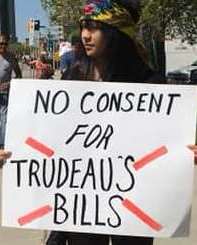 
On June 3, the National Inquiry into Missing and
Murdered
Indigenous Women and Girls will release its final report. The
inquiry came after years of advocacy efforts led by grassroots
Indigenous women who called upon the Canadian state to address
the systemic and root causes of violence faced by Indigenous
women and girls. Meanwhile, the abuse continues due to the
failure of the Government of Canada to end colonial relations and
treatment of Indigenous peoples once and for all and establish
nation-to-nation relations and provide redress for all the crimes
committed against them.
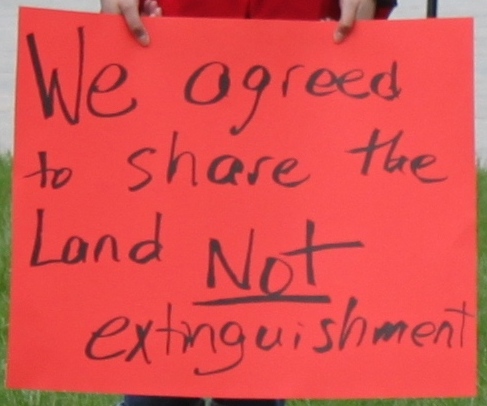 To protest continued
mistreatment and abuse, on May 27,
Indigenous peoples and their supporters held actions across the
country which specifically targeted several bills being imposed
on them. They have not been meaningfully consulted on these
bills, which fail to recognize the nation-to-nation relations
that must underpin Canada's relations with the Indigenous
peoples.[1] These bills
come in the context of the Trudeau Liberals' widely rejected
10-point framework that sought to extinguish hereditary rights,
which the government was forced to back down from in December
2018.[2] All told, they are
tantamount to a new White Paper 2.0, which like the 1969 White
Paper tabled by then-Prime Minister Pierre Trudeau and his
Justice Minister Jean Chrétien, are aimed at extinguishing
Indigenous peoples' hereditary and treaty rights. Actions were
held in Vancouver, Edmonton, Calgary, Saskatoon, Winnipeg, Sault
St. Marie, London, and Ottawa. To protest continued
mistreatment and abuse, on May 27,
Indigenous peoples and their supporters held actions across the
country which specifically targeted several bills being imposed
on them. They have not been meaningfully consulted on these
bills, which fail to recognize the nation-to-nation relations
that must underpin Canada's relations with the Indigenous
peoples.[1] These bills
come in the context of the Trudeau Liberals' widely rejected
10-point framework that sought to extinguish hereditary rights,
which the government was forced to back down from in December
2018.[2] All told, they are
tantamount to a new White Paper 2.0, which like the 1969 White
Paper tabled by then-Prime Minister Pierre Trudeau and his
Justice Minister Jean Chrétien, are aimed at extinguishing
Indigenous peoples' hereditary and treaty rights. Actions were
held in Vancouver, Edmonton, Calgary, Saskatoon, Winnipeg, Sault
St. Marie, London, and Ottawa.
At the action on Parliament Hill, Chief Lee Crowchild of
the
Tsuut'ina First Nation called on everyone to educate themselves
on the proposed legislation. "I think this day of action, this
reality that's taking place across Canada is a wakeup call for
the generations that we can't just sit idly by," he said.
Speakers at the Ottawa action reiterated the
problematic
nature of the Indigenous child welfare bill, that is supposed to
help Indigenous communities gain jurisdiction over child welfare,
while money will still come via provincial governments. The need
for Indigenous people to create their own child welfare laws was
also emphasized. "We as first nations are in the process of our
own. Developing our own law, and this law on childcare is
pending. So in essence we know what the problem is, and we will
know how to fix," said Chief Henry Lewis of the Onion Lake Cree
Nation.
From Parliament Hill, the demonstrators went to the
Prime
Minister's Office and after a brief picket marched down
Wellington Street to the building where the Senate of Canada is
located.
At the rally in Winnipeg, organizer Elyssa McIvor
directed her
remarks "To the federal government and Justin Trudeau, also
Carolyn Bennett and Seamus O'Regan" She said, "They need to know that
they
don't have our consent [for these bills]. They never informed us
of these changes, and we will fight it till the end."
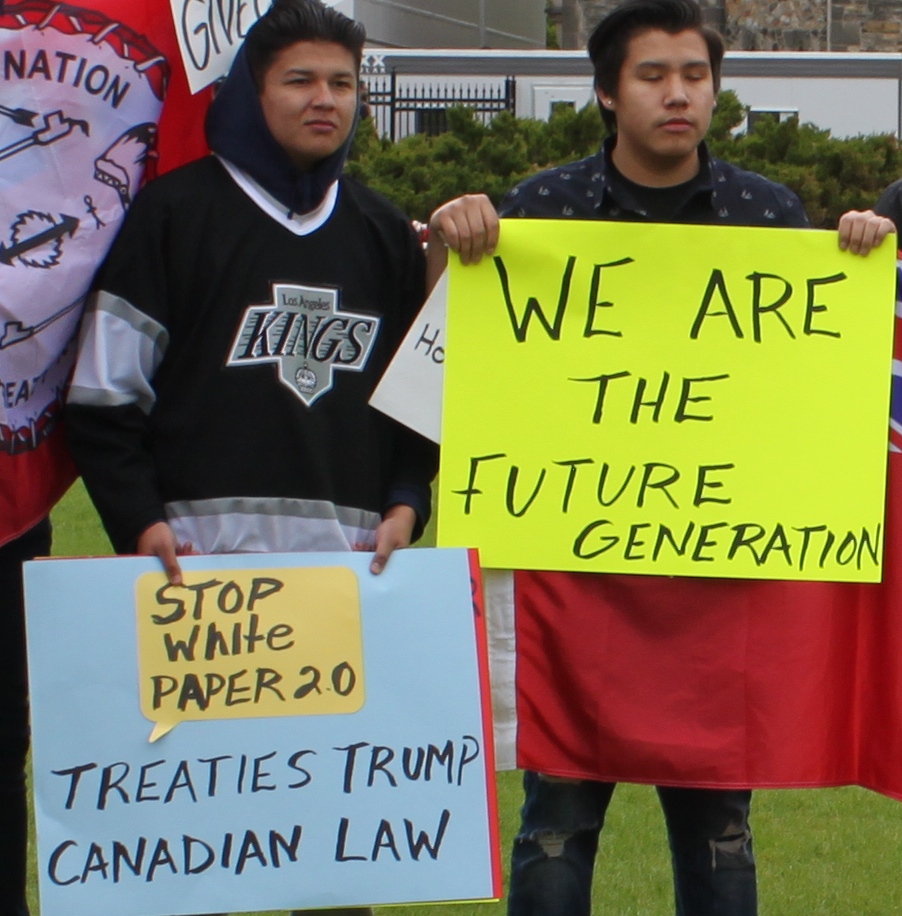 She added, "These bills
are falsely claiming that
they
will give us more self-government, more self-determination, more
control of our services, more control of our territories. But in
reality, it is lessening and weakening everything that we are
trying to work toward." She added, "These bills
are falsely claiming that
they
will give us more self-government, more self-determination, more
control of our services, more control of our territories. But in
reality, it is lessening and weakening everything that we are
trying to work toward."
McIvor said that the Winnipeg march, from the Canadian
Museum of Human Rights to the Manitoba Legislature, included
participants from Treaty 1, Treaty 2 and Treaty 5 territory, and their
supporters.
In Calgary, one hundred people rallied downtown at
Olympic Plaza. Speakers and slogans emphasized the fact that
Indigenous peoples will not accept assimilation and they are
determined to uphold their sovereignty along with
nation-to-nation relations with Canada. Everyone gathered then
marched to the Harry Hays federal building and back, where they
continued to voice their demands.
Another protest was held in Calgary on May 30 outside of
the
First Nations Innovation & Success National Meeting, taking place
at the Westin Hotel from May 28-30. The meeting is organized by
the First Nation Fiscal Institutions (First Nations Finance
Authority, First Nations Financial Management Board, and the
First Nations Tax Commission) and the First Nations Lands
Advisory Board. This includes First Nations participating in the First
Nations
Fiscal
Management
Act, the Framework
Agreement on First Nation Land Management (FAFNLM) and First
Nations which are entering 10-year grants with the federal
government.
More rallies are planned throughout the summer by
Indigenous
leaders and grassroots organizations, in advance of the federal
election, APTN News reports.
Vancouver, BC
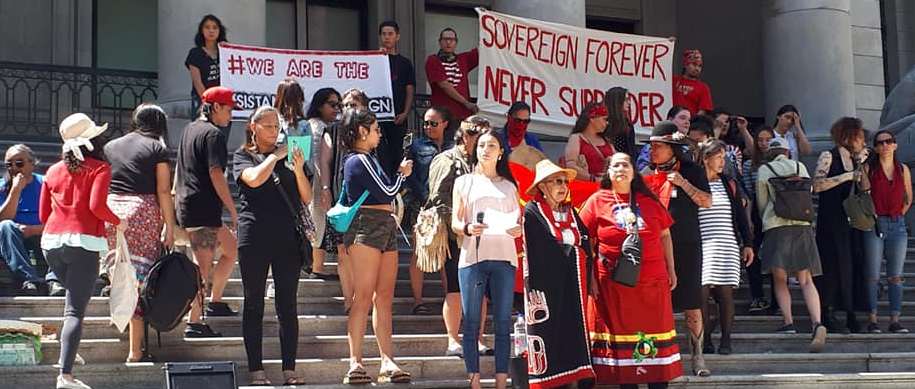
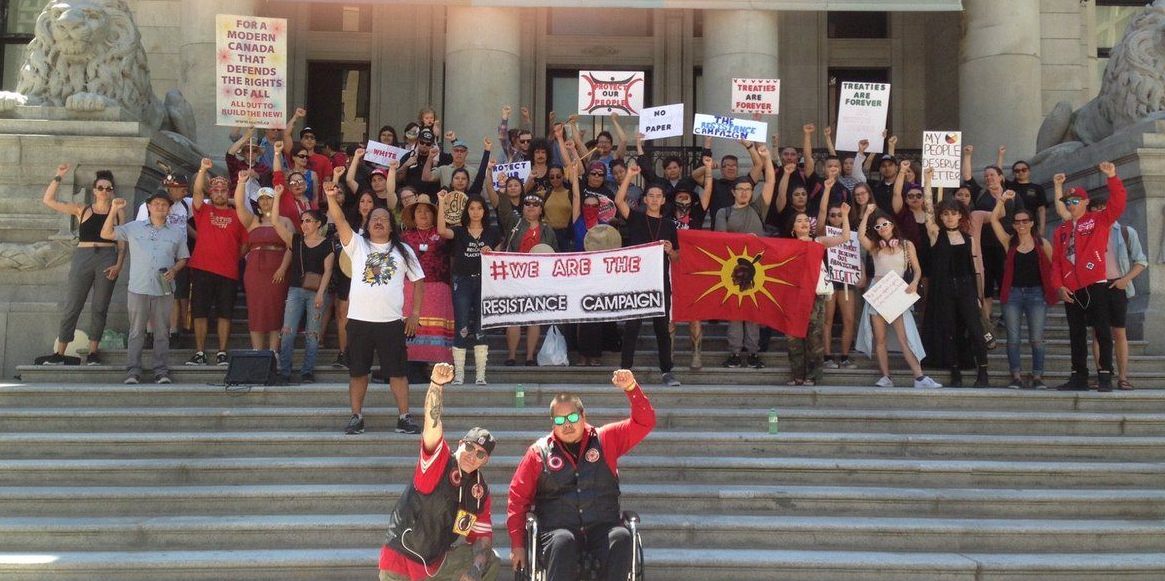
Edmonton, AB


Calgary, AB
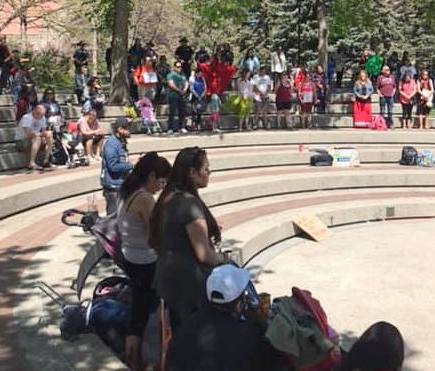 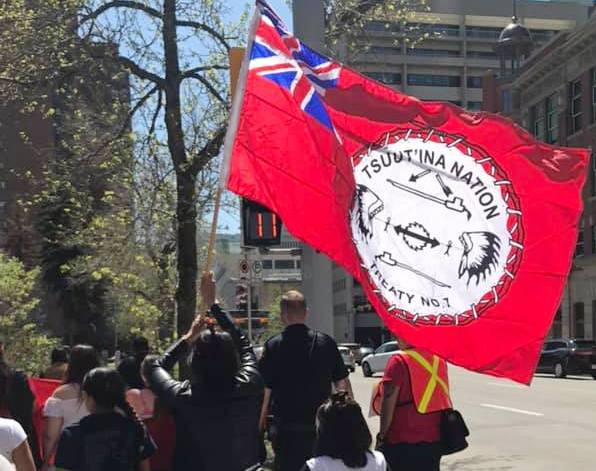
Saskatoon, SK
 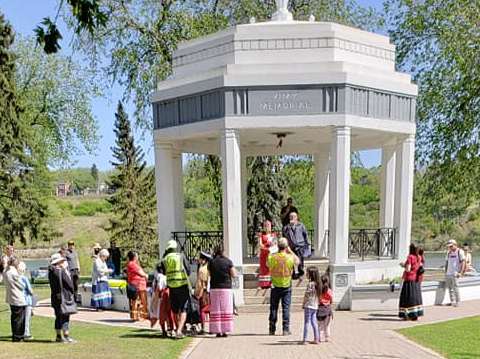
Winnipeg, MB
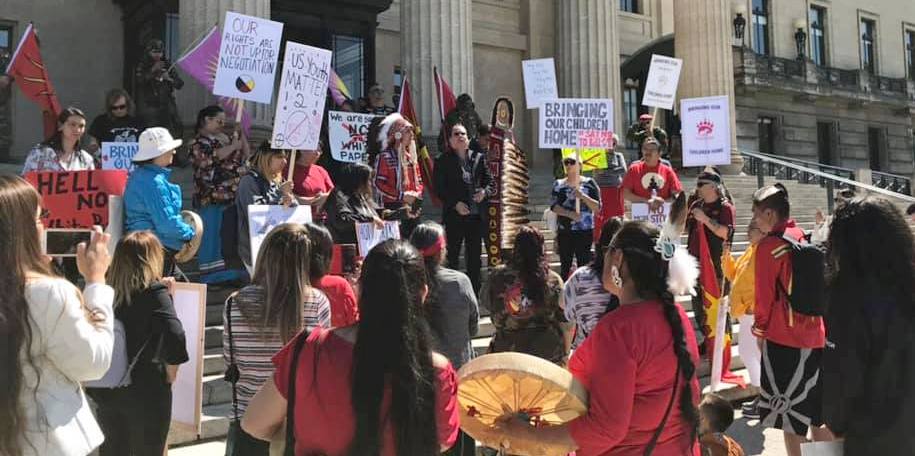
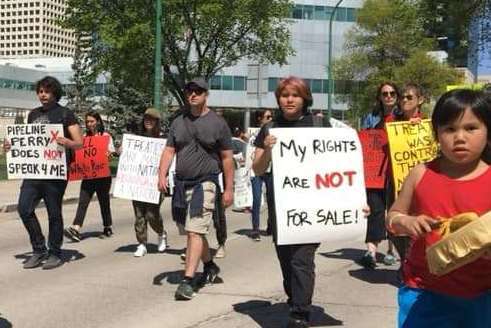 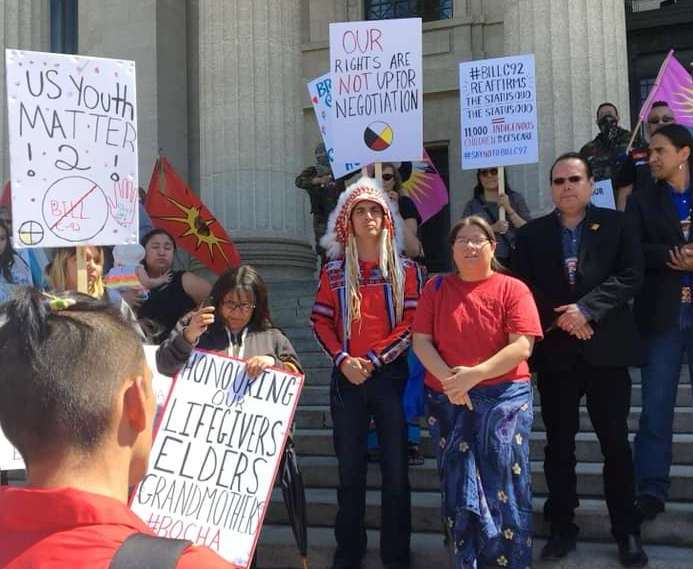
Sudbury, ON

London, ON

Ottawa, ON


Notes
1. The bills in
question are Bill C-91, the Indigenous Languages Act (at
second reading in the Senate); Bill C-92, An Act respecting
First Nations, Inuit and Métis children, youth and families
(at second reading and referred to the Standing Committee on
Indigenous and Northern Affairs); Bill C-97, the 2019 omnibus
budget implementation bill (at second reading and referred to
committee in the House of Commons) that created the Department of
Indigenous Services and Crown-Indigenous Relations and Northern
Affairs to replace Indigenous and Northern Affairs Canada; and
the 2018 budget implementation Bill C-86 (received Royal Assent
in December 2018), that amends the First Nations Land
Management Act and the First Nations Fiscal Management
Act. Bills C-91 and C-92 are anticipated to receive Royal
Assent in June, CBC News reports.
Currently, the House of Commons is scheduled to rise for
the
summer recess on June 21, and the Trudeau government is seeking
to extend sitting hours to push through these and other bills
before then, or to have a summer sitting.
2. "Trudeau Liberals' New
Attempt
at a
'Final Solution' to Extinguish Hereditary Rights," Pauline
Easton, TML Weekly, December 4, 2018.


Picket in Terrace, April 18, 2019, outside Senate hearings on Bill
C-48, the Oil Tanker Moratorium Act,
which
would
ban
tankers
carrying
more
than
12,500
metric
tonnes
of
oil
from
stopping
or
unloading
along
BC’s
northern
coast.
A BC Court of Appeal decision released on May 24 rules
that
proposed amendments to BC's Environmental Management Act
(EMA) are outside provincial jurisdiction. This "leaves British
Columbians vulnerable to health, safety and environmental risks
associated with increased transportation of heavy oil through the
province," a press release issued by West Coast Environmental Law
says.
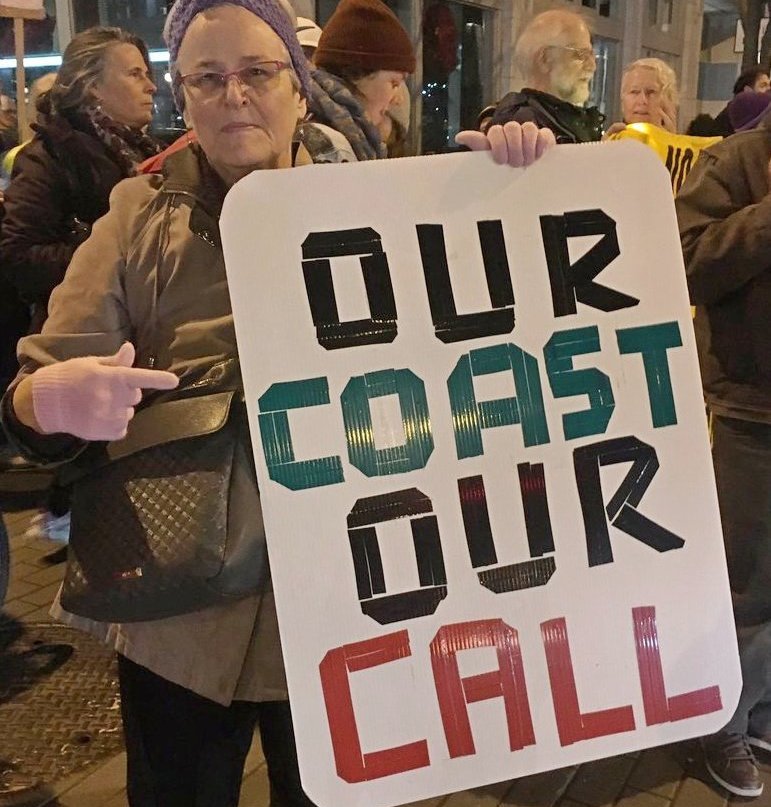 "BC's proposed amendments
included a permitting regime
for
companies that transport hazardous substances, such as diluted
bitumen, through the province," the press release says. "BC's proposed amendments
included a permitting regime
for
companies that transport hazardous substances, such as diluted
bitumen, through the province," the press release says.
"Addressing the environmental challenges of our time
will
require effective action by all jurisdictions: federal,
provincial and Indigenous," said Jessica Clogg, Executive
Director and Senior Counsel. "With this judgment, the BC Court of
Appeal has turned back the clock on cooperative federalism,
putting our health, safety and environment at risk."
Staff Lawyer Eugene Kung points out that the decision is
a
loss because "Oil spills don't respect borders, and neither does
climate change." He said, "It is also a slap in the face to Indigenous
governments whose jurisdiction has been ignored."
The BC government has announced that it plans to appeal
the
ruling to the Supreme Court of Canada. If the Supreme Court of
Canada accepts the appeal, it will rule on the constitutionality
of BC's proposed law which, arguably, does not resolve the
substantive issue which is the justice of the cause for which the
people of BC and the Indigenous peoples are fighting.
The Haida and Heiltsuk Nations decried the decision of
the BC
Court of Appeal saying in a press release that it "reduces the
power of provinces to protect lands and waters from
inter-provincial infrastructural projects, and fails to recognize
the role of Indigenous peoples in protecting the environment. The
decision will increase the risk of oil spills and environmental
damage associated with the proposed Trans Mountain pipeline
expansion."
 "Today's ruling is
disappointing as it reveals the lack
of
understanding and/or unwillingness of the courts to properly
recognize Indigenous jurisdiction over our territories. The
failure to recognize our arguments in the ruling is a missed
opportunity for the courts to demonstrate an act of genuine
reconciliation," says Nang Kaadlljuus President of the Haida
Nation Gaagwiis Jason Alsop. "Today's ruling is
disappointing as it reveals the lack
of
understanding and/or unwillingness of the courts to properly
recognize Indigenous jurisdiction over our territories. The
failure to recognize our arguments in the ruling is a missed
opportunity for the courts to demonstrate an act of genuine
reconciliation," says Nang Kaadlljuus President of the Haida
Nation Gaagwiis Jason Alsop.
"The Court of Appeal's ruling is offensive and
irresponsible.
It is unacceptable that despite being granted interested party
status, the court failed to even acknowledge ours or any other
Indigenous government's arguments in its decision. They invited
us into the room, but they completely ignored us," adds Marilyn
Slett, elected Chief Councillor of the Heiltsuk Nation. "Despite
over 30 years of litigation that has reinforced constitutional
recognition of the rights of Indigenous peoples, the Court took
an overly narrow view. In this era of reconciliation and Crown
commitments to implement the United Nations Declaration on the
Rights of Indigenous Peoples, the decision today is a big step
backwards," she said.
The press release by the Heiltsuk and Haida
said they
were among four Indigenous interested persons that presented
arguments to support BC in protecting the environment. They made
arguments related to their inherent Indigenous title and rights
and addressed gaps in the existing spill response framework that
BC's proposed legislation would address. "However, today's
reasoning makes no mention of Indigenous arguments, instead
referring solely to federal and provincial jurisdiction. Ignoring
Indigenous jurisdiction reflects continued unwillingness to take
practical steps towards reconciliation and recognition of title
and rights in the real world," the press release pointed
out.
Gaagwiis reminded the public that "Indigenous
governments are
not equivalent in power to municipalities, that courts can choose
to hear or ignore when convenient. We speak as Nations. Our laws
and jurisdictions are the first order of government, as they flow
from the natural laws of Earth. We have a responsibility to
uphold these laws and protect our territories for future
generations of our people and Canadians."
The press release explains that in the court, speaking
in
support of BC's proposed legislation, the Heiltsuk nation
presented its experience with the Nathan E. Stewart oil spill
which "brought to light gaps in federal spill response that have
negatively impacted the remote community's recovery from the 2016
spill. These gaps were not even addressed by the court and, as a
result of today's decision, they remain in place:"

Protest by Heiltsuk Nation during visit by Transport Minister
Marc Garneau in November 2016, shortly after the Nathan
E.
Stewart
tug ran aground on their territory.
The gaps include failure to compensate for Indigenous
losses. "In the event of an oil spill there is currently no
compensation
available for many Indigenous losses, including communal losses.
This is because compensation under Canada's Ship-Source Oil
Pollution Fund and Marine Liability Act's definition of
'pollution damage' focuses exclusively on 'loss of profit,'
ignoring the devastating impacts spills may have on the food,
social, and ceremonial losses."
There is also no requirement for a robust Environmental
Impact
Assessment, the Heiltsuk pointed out. "Both provincial and
federal legislation do not presently have any mandatory
requirements for an environmental impact assessment to be
conducted, or provide capacity funding for Indigenous governments
to conduct one themselves. An environmental impact assessment is
critical to understanding both the short and long-term effects of
an oil spill on the natural environment."
"While both these gaps exist, Indigenous nations will
continue
to be disproportionately impacted by oil spills," the press
release explains.
For a copy of the decision, click
here. For a PDF of the press release, click
here.
For
Heiltsuk's earlier
release on the reference case, click
here.

Contention Over the Arctic
- Peter Ewart -

This map is part of the Canadian government's submission to the United
Nations
Commission on the Limits of the Continental Shelf.
Under the United Nations Convention on the Law of the
Sea
(UNCLOS), all coastal states have a continental shelf extending
200 nautical miles. However, it could extend beyond 200 nautical
miles if the shelf is a "natural prolongation of [the state's]
land territory." This latter is often referred to as the
"extended" or "outer" continental shelf and applies in the case of an
estimated 85
countries.
In this regard, on May 23, the Canadian government filed
a
2,100-page submission with the UN Commission on the Limits of the
Continental
Shelf regarding Canada's continental shelf in the
Arctic Ocean. Article 76 of UNCLOS "sets out a process for states
to determine the limits of the continental shelf" and involves
making a submission to an expert body of the Commission and
having it reviewed.
This UNCLOS process is part of a compromise that
"balances
recognition of the inherent rights of a coastal state over its
continental shelf with the interest of the international
community in defining the limits of seabed beyond national
jurisdiction."
To establish the outer limits of the shelf, technical
and
scientific data is gathered on the physical attributes of the
seabed as well as distance from shore. These attributes are then
used to determine a series of latitudinal and longitudinal
coordinates by which the outer limits are defined.
To prepare the submission, the Canadian government
brought
together a team of scientists, technical personnel and lawyers
from various departments who were responsible for collecting and
interpreting thousands of kilometres of bathymetric, gravimetric,
seismic and other types of data. Others were also involved in the
collection, including Indigenous peoples, territorial
governments, and the Department of National Defence. In addition,
Canada collaborated with the Kingdom of Denmark, Sweden and the
United States in joint surveys and scientific activity.
The Arctic Ocean is rich in natural resources, including
oil,
gas, minerals and fisheries amounting to trillions of dollars.
Under the Convention on the Law of the Sea, coastal states
exercise sovereign rights over the continental shelf "for the
purpose of exploring it and exploiting its natural
resources."
Establishing shelf boundaries and other issues related
to the
oceans can be highly contentious. According to its preamble, the
stated purpose of UNCLOS is "to settle, in a spirit of mutual
understanding and cooperation, all issues related to the law of
the sea." Most countries of the world have signed on to UNCLOS.
However, the U.S. has yet to ratify the convention,
although it now recognizes it "as a codification of customary
international law."
Canada's submission to UNCLOS covers 1.2 million square
kilometres of seabed and subsoil in the Arctic Ocean, including
the North Pole. As such, it overlaps in some areas with the
submissions of other Arctic states.
For example, Canada, Russia and Denmark (Greenland) are
each
claiming the vast underwater Lomonosov Ridge, which stretches
for 1,800 kilometres between the three countries, to be an
extension of their respective continental shelves. The ridge,
which includes the North Pole, was first discovered in 1948-49 by
Soviet expeditions conducting hydrological measurements and is
named after a famous Russian naturalist. In 2007, Russian
deep-sea submersibles descended the Arctic Ocean and planted the
Russian flag on the Ridge, an action which triggered "an
international outcry and indignation." Canada's foreign minister
at that time, Peter McKay, stated: "This isn't the 15th century.
You can't go around the world and just plant flags and say:
'We're claiming this territory.'"
In addition to the above, Canada has a longstanding
boundary
dispute with the U.S. involving 21,000 square kilometres of the
Beaufort Sea, as well as a territorial dispute with the U.S. over
Canada's claim to the Northwest Passage.
The next step in the UNCLOS process will be for the
Commission
to consider Canada's 2,100-page submission and develop
recommendations regarding the outer limits of Canada's
continental shelf. However, it could take as long as 10 years to
complete the process, or longer if additional time is needed to
delimit overlapping boundaries with neighbouring
states.

Canada-Cuba Relations
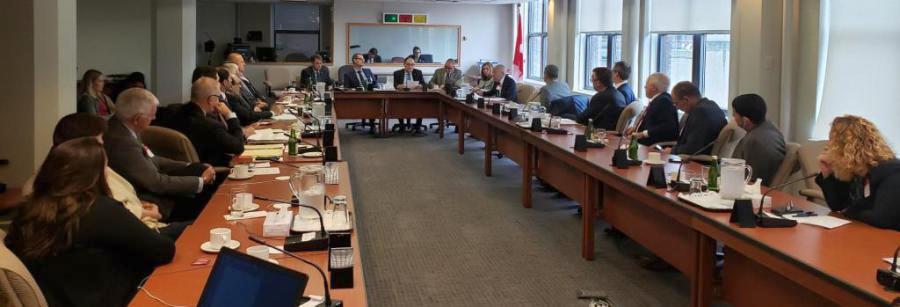
The morning of May 28, a Symposium on Cuba was held
at the
federal Canadian Parliament, under the auspices of the Hon.
Senator Pierrette Ringuette and Member of Parliament T.J. Harvey,
Co-Chairs of the
Canada-Cuba Parliamentary Friendship Group, on the initiative of
the Canadian Network on Cuba.
The opening panel, made up of renowned scholars, namely,
Isaac
Saney, John Kirk and Julia Sagebien from Dalhousie University,
Halifax; and Professor Keith Ellis from York University,
Toronto, examined Cuba-Canada's long-standing positive bilateral
relations, current challenges and future prospects; as well as
Cuba's economy, society and foreign policy.
The second and last panel of the meeting focused on the
nature
of the Canadian trade relationship with Cuba, its importance for
both countries, and the impact of the escalation of U.S. economic
sanctions against Cuba on Canadian companies doing business with
the island, particularly, after the activation of Title III and
the threat to enact Title IV of the Helms-Burton Act.
Among the panelists were representatives of Canadian companies
and organizations that maintain links with Cuba, including
Sherritt International Corp., Acasta Capital, the National Bank of
Canada, Gowling WLG international law firm, Air Transat and the
Chamber of Commerce and Industry Canada-Cuba.
In addition to Senator Ringuette and MP Harvey, the
Honourable
Senators Stan
Kutcher, Beverley Busson and Diane Giffin; and Members of
Parliament Michel Picard, Anthony Rota and Fayçal
El-Khoury, were also in attendance.
Representating the Embassy
of
Cuba at the Symposium in Ottawa were Ambassador Josefina Vidal,
accompanied by
other members of the diplomatic staff.
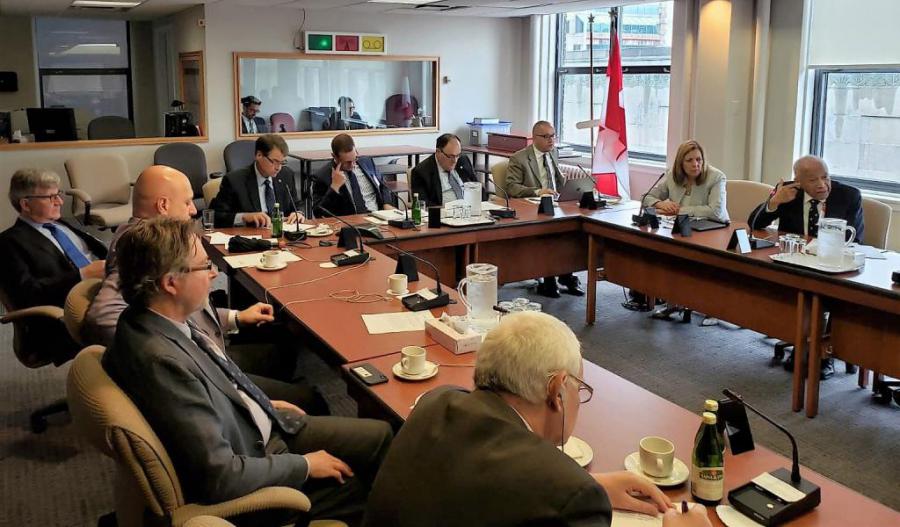


Ottawa
On May 25, the Cuban-Canadian Association of
Ottawa-Gatineau organized a picket in front of Parliament in
Ottawa to protest the closing of consular services at the
Canadian Embassy in Havana. This action by the Canadian
government means that the Canadian visa office in Havana will not
process the biometric data (fingerprints and photos) required for
visa applications for Cubans to travel to Canada. This creates
great difficulties for Cuban families who will have no choice but
to travel outside the country to get a visa. This implies
exorbitant expenses and travel to a third country and makes
family visits and cultural exchanges almost impossible. The
members of the Cuban-Canadian Association of Ottawa-Gatineau, who
were joined by members of Ottawa Cuba Connections and ALBA Social
Movement, Ottawa Chapter, called on the Canadian Government to
fulfill its responsibilities and provide all the services that
are part of the diplomatic relations between Canada and Cuba.
Also that day in Montreal, Cubans residents in that
city,
along with friends of Cuba held a similar action outside the
federal government offices at Complexe Guy Favreau.

Montreal

- Canadian Association of Latin American
and
Caribbean Studies -
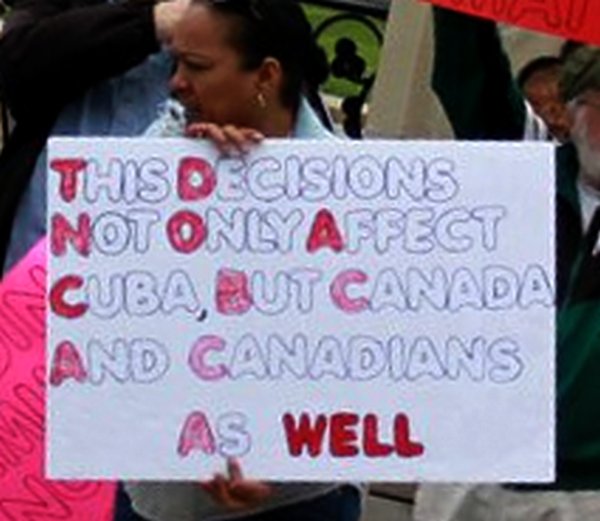 Dear Prime Minister Justin
Trudeau, Dear Prime Minister Justin
Trudeau,
On behalf of the Canadian Association of Latin American
and
Caribbean Studies (CALACS), we write to express our concern with
the Canadian visa application process for Latin American and
Caribbean scholars who wish to visit Canada for academic meetings
and conferences. Our Association held its 50th annual conference
at York University in Toronto on May 10-12 -- a milestone for
Latin American and Caribbean studies in Canada -- and,
unfortunately, four distinguished Latin American scholars, three
Cuban and one Brazilian, never received their visas allowing them
to travel to Canada, despite having undertaken the process more
than three months in advance and having paid for all their travel
and lodging expenses.
In the case of the Cuban scholars, the treatment they
received
from the Visa Section at the Canadian embassy in Havana was
cavalier and disrespectful. The Canadian government only informed
them that their visas were not going to be processed and that
they would have to reapply outside of Cuba on May 8, just two
days before the start of the conference. This conduct does not
meet the standards we expect and demand from the Canadian public
service.
We acutely felt the absence of these Latin American
scholars
and strongly debated the issue at our conference. At CALACS, we
feel that Canada's failure to deliver their visas interferes with
our mission to foster the ongoing development of a dynamic
Canadian-based, international intellectual community, to support
research and teaching and to provide the infrastructure and
capacity to facilitate knowledge mobilization and engagement
strategies in Canada and abroad.
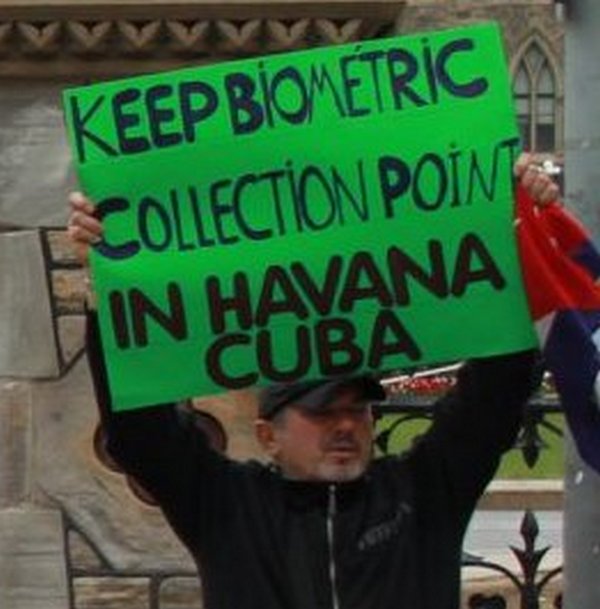 CALACS reaches out to and
establishes partnerships with
Latin
American and Caribbean communities, NGOs, research institutions,
and international academics. In addition, our Association works
to inform policy makers, and public and private sector
organizations through its events, publications, communications
media and virtual resources. In so doing, we contribute to
developing strong and long-lasting Canadian networks in Latin
America and in the Caribbean and we promote Canada's image and
influence in the region. In this sense, Canada's failure to
provide visas for Latin American and Caribbean scholars in timely
and respectful fashion can only be understood as a failure. CALACS reaches out to and
establishes partnerships with
Latin
American and Caribbean communities, NGOs, research institutions,
and international academics. In addition, our Association works
to inform policy makers, and public and private sector
organizations through its events, publications, communications
media and virtual resources. In so doing, we contribute to
developing strong and long-lasting Canadian networks in Latin
America and in the Caribbean and we promote Canada's image and
influence in the region. In this sense, Canada's failure to
provide visas for Latin American and Caribbean scholars in timely
and respectful fashion can only be understood as a failure.
We appeal to you to make sure that Canadian visa
processes
never again stand in the way of scholarly activities, of free
thought and of critical debate. Academic freedom can only promote
and develop Canadian interests at home and abroad and is
critically important for maintaining excellent political,
economic and cultural relations with Latin American and Caribbean
countries.
Respectfully,
The Board of Directors of
the Canadian Association for
Latin
American and Caribbean Studies


Ottawa, May 10, 2019
Canadians and Quebeckers from all walks of life
treasure
the longstanding and warm relations with the Cuban people. Within
this situation, the Cuba solidarity movement plays a vital role
to deepen these relations in practical ways. This includes public
events with Cuban speakers and other experts to elaborate Cuba's
revolutionary nation-building project and how it permits the
flourishing of the human person, its profound internationalism
and social love for the peoples of the world that always upholds
the rule of law and the cause of peace in international
relations. One of the most important aspects of the solidarity
with Cuba at this time is to make sure that Cuba cannot be
isolated by the stepped-up U.S. campaign against Cuba, first and
foremost the U.S. illegal blockade intended to overthrow the
Cuban Revolution.
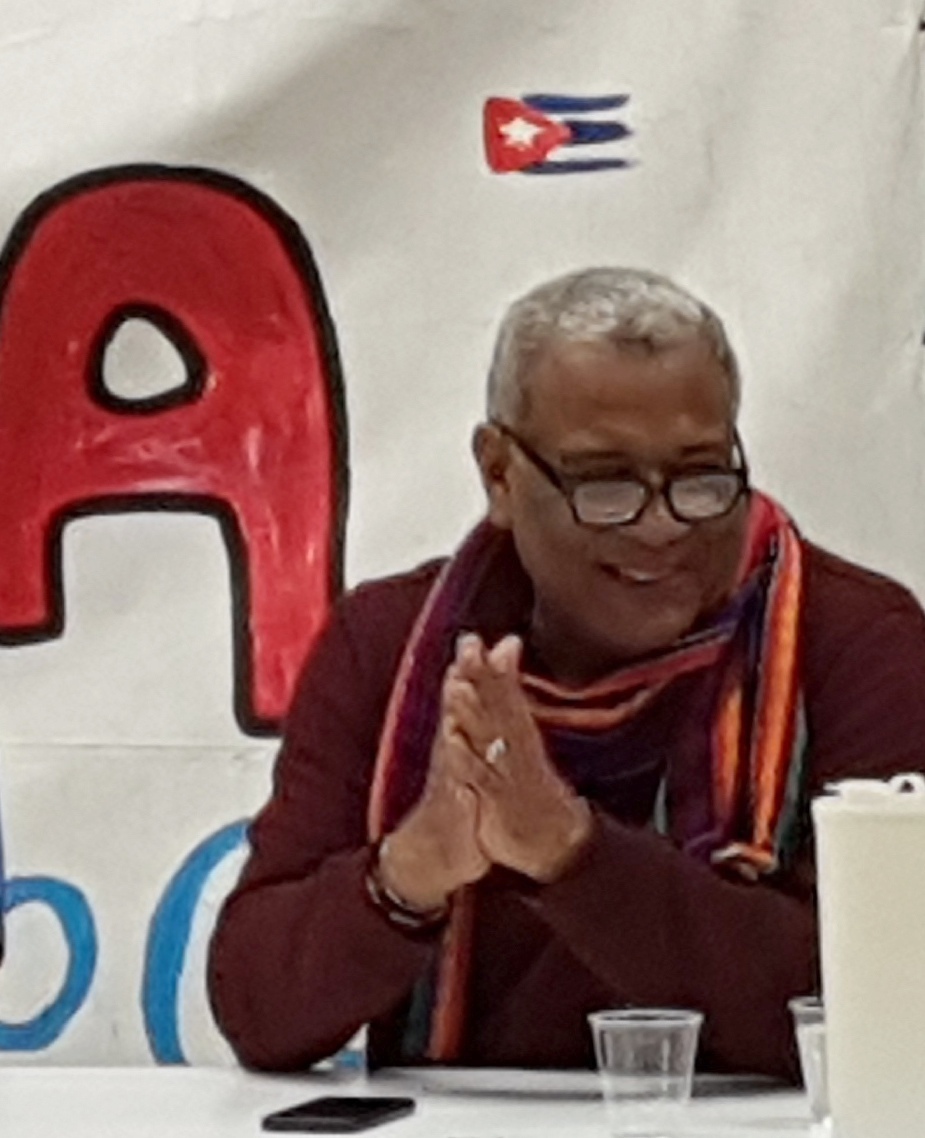
Rev. Luis Barrios in Montreal, May 9, 2019.
|
One of the practical projects taken up by the solidarity
movement in Canada to overcome the blockade is participation in
the Peace Caravan, an annual tour led by the U.S. organization
Interreligious Foundation for Community Organization
(IFCO)/Pastors for Peace. Every year for the past 30 years, it
has travelled through Canada, the U.S. and Mexico, to inform
people about Cuba and collect important humanitarian goods to
send to Cuba, in defiance of the blockade.
Events for the Canadian leg of this year's Peace Caravan
received Reverend Luis Barrios of Pastors for Peace. The first
event was held in Montreal on May 9 at the Centre Patro Le
Prevost, hosted by the Quebec-Cuba Friendship Caravan.
The Peace Caravan then stopped in Ottawa on May 10 at
St.
Giles Presbyterian Church. The event was hosted by Ottawa Cuba
Connections, ALBA Social Movements-Ottawa, Frente Bolivariano
Hugo Chavez, Association d'amitie Outaouais-Cuba and the Peace
and Social Concerns Committee of the Quakers. Notably, Ottawa
Cuba Connections has the distinction of taking part in the
caravans since they began 30 years ago, and is sending a
participant to this year's edition as well.
These were followed by an event in Kingston on May 11 at
Sydenham Street United Church and Toronto on May 12 at San
Lorenzo Anglican Church.
At these events, Rev. Barrios reaffirmed the solidarity
movement's commitment to the fight against the blockade despite
the enormous hurdles imposed by the U.S. administration. He
explained how the Trump administration's implementation of Title
III of the Helms-Burton Act is not just an attack on the
Cuban people but also on the sovereignty of many other countries,
including Canada, as well as an attack on the business interests
of companies throughout the world, including in Canada. He went on
to elaborate that this is part of a more profound U.S. agenda to
recolonize Latin America and the Caribbean. For example, U.S.
National Security Advisor John Bolton has explicitly talked about
the U.S. taking control of Venezuela's vast oil reserves.
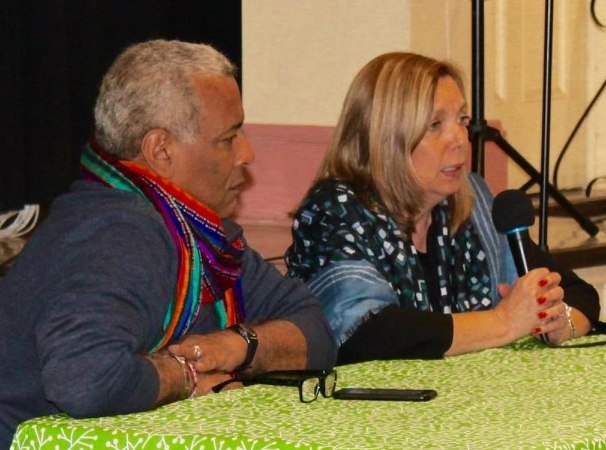 Cuban Ambassador Josefina
Vidal also spoke at the Ottawa
event. She thanked Pastors for Peace for their support to and
solidarity with the Cuban people throughout all these years, and
underscored that Cubans will never forget the images transmitted
worldwide of Pastors for Peace, led by Lucius Walker, confronting
the heavily armed authorities on the United States-Mexico border.
Likewise, on behalf of the Cuban people, the Cuban diplomat also
thanked the Canadian solidarity movement for always standing by
Cuba. Cuban Ambassador Josefina
Vidal also spoke at the Ottawa
event. She thanked Pastors for Peace for their support to and
solidarity with the Cuban people throughout all these years, and
underscored that Cubans will never forget the images transmitted
worldwide of Pastors for Peace, led by Lucius Walker, confronting
the heavily armed authorities on the United States-Mexico border.
Likewise, on behalf of the Cuban people, the Cuban diplomat also
thanked the Canadian solidarity movement for always standing by
Cuba.
John Waller, Program Coordinator for Pastors for Peace,
explained to TML Weekly that "the hostility of the U.S.
government toward Cuba has always created a myriad of logistical
challenges for our project. This was most extreme under the Bush
administration when our caravanistas were being threatened with
legal harassment and fines. Those particular actions stopped
under Obama and so far haven't resumed under Trump, but we have
to prepare in case they do this year."
Waller went on to explain, "The U.S. caravan is just
about to
happen. It begins on June 8 with public events in 40 U.S. cities.
We are taking 37 people to Cuba without a U.S. government
licence, many of them travelling to Cuba for the first time.
Almost half are young people under 30. The caravanistas are
principally U.S. citizens, especially from Seattle, New York,
Minneapolis and Fresno but we also have international
representation from Canada, Mexico and Germany.
"The Canadian events in early May received a very warm
response from those who attended. We anticipate that in the U.S.
people who come to our Caravan events will be outraged by what
Trump is doing, after a period in the latter years of the Obama
presidency where limited but significant steps had been taken in
the direction of normalizing relations between the U.S. and
Cuba."
The Peace Caravan will then go to Mexico, where the
program
includes an orientation for participants in Mexico City, June
22-23, before they travel to Cuba. The caravan concludes on July
5, with participants returning home via Mexico City.

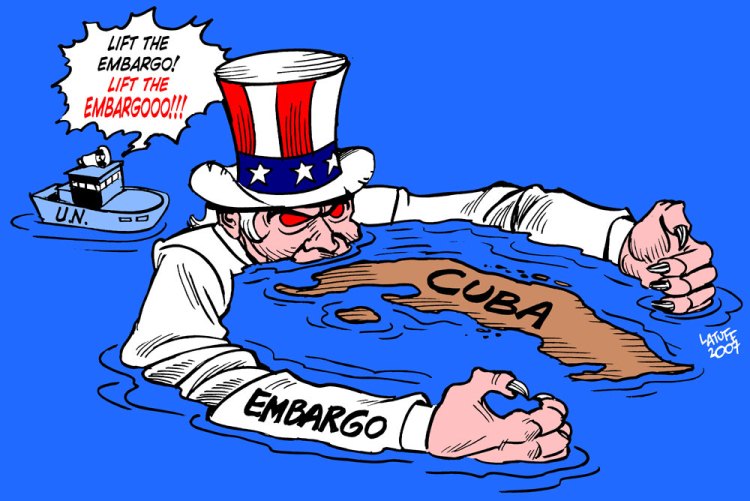
Toronto
Friday, June 7 -- 7:00 pm
A Different Booklist, 779 Bathurst St.
Sponsored by: Canadian
Network on Cuba and A Different Booklist
Cuban Consul Yoslaidy Clemente López and Dr.
Isaac Saney (noted Cuba
specialist and co-chair and spokesperson of the Canadian Network on
Cuba)
will discuss the current situations in Cuba and in Latin America and
the Caribbean as a whole. This is the kickoff for the 9th CNC
biennial convention, June 8-9.

Opposition to New Attempts to Impose U.S.
Dictate
- Sir Ronald Sanders -
 
Mass action in Venezuela, April 27, 2019, celebrates the country's exit
from the OAS.
Sir Ronald Sanders is Antigua and Barbuda's
Ambassador to
the U.S. and OAS. He is also a Senior Fellow at the Institute of
Commonwealth Studies, University of London and Massey College,
University of Toronto.
Readers of this commentary, particularly those in small
countries, might wonder why they should be concerned about who is
the Chief Executive Officer (CEO) of any multilateral or
international organization. It could be claimed that the
disposition of the person, holding such an office, is far removed
from the existence of people who are focussed on the necessities
of living and improving their lives.
They would be wrong to dismiss interest in the holders
of
these positions.
Caribbean small states are already marginalized in the
world
with little account being taken of the significant threats posed
to their well-being. Among those threats are climate change,
global warming, exclusion from access to concessional funds for
development, very poor terms of trade, increasing erosion of
their sovereign rights over matters such as the rate of taxes
they charge and the incentives they offer to businesses so as to
remain globally competitive in the industries that provide
employment and the opportunity for ownership.
In this context, it is vitally important to people in
small
and vulnerable countries that the CEOs of inter-governmental
organizations are persons with a commitment to reducing poverty,
advancing economic development, improving access to education and
training, and promoting international arrangements that allow
developing countries to compete in the global community. It is
also important that such CEOs be genuinely interested in
safeguarding human rights, protecting citizens from abuse by
governments, and upholding democracy and freedom of
expression.
These are the qualities that heads of multilateral and
international organizations should possess if they are to serve
the interests of the global community, particularly the people of
small and vulnerable nations.
Inevitably, however, governments of larger and more
powerful
countries dictate the persons who end up in these positions.
These governments select candidates, who serve their interests,
and using their greater financial resources and capacity to
pressure others, they ensure their appointments.
In the cases of the International Monetary Fund and the
World
Bank, the European Union and the U.S. have long since arrogated
the posts of heads of these organizations to themselves through
an understanding between them that the U.S. will hold the
headship of the Bank and the Europeans the headship of the Fund.
Invariably, the holders of these posts are then in thrall to
their patrons and, over the decades of the existence of the two
organizations, few of them have strayed far from the positions of
their sponsors.
There are only a few organizations in which Caribbean
countries have a genuine opportunity to influence who is elected
as their chief executive. The Organization of American States
(OAS) is one of them.
Repeatedly, I have called for the 14 member states of
the
Caribbean Community (CARICOM), that are also members of the OAS,
to nominate one suitably qualified Caribbean candidate for the
post of Secretary-General or to agree on a non-Caribbean person
who would be mindful of the importance of Caribbean
interests.

"No to interference by Luis Almagro -- Venezuela
must be respected."
|
It is alarming that,
counter to all electoral
arrangements
that have ever been instituted for the election of the OAS
Secretary-General, certain governments are busy promoting the
idea that, at the OAS General Assembly in Colombia in June, 18
countries should force through the re-election of the incumbent,
Luis Almagro, for a second term -- one year before such an
election is due, and for which no proper arrangements have been
made. This process is usually called "rigging."
Such an action would be as unprecedented as it would be
wrong.
Forced re-election of Mr. Almagro, one year before an election is
due, would be highly improper. But, it could be done. The rules
allow for the nomination of a candidate up to the morning of the
day an election is held. And, if, as has been the recent
experience, 18 countries vote to hold such an election at the
General Assembly in June, it can be done.
In this way, any possibility of an unprepared CARICOM
nominating a single Caribbean candidate or coalescing behind an
approved non-Caribbean candidate would be scuttled. The decision
of the 18 would prevail, and the interests of the Caribbean and
the Caribbean people would be swept aside.
That is why Caribbean people should be interested in
this
matter, and in the position that their governments take.
The behaviour of Mr. Almagro as Secretary-General of the
OAS
has left much to be desired. He is a very bright and clever man,
and with a different attitude, he might have served well the OAS
and all its member-states. But, instead of ending divisions by
building bridges between states and working to garner consensus
within the organization, Mr. Almagro has become a divisive
figure.
Further, his disregard for the Permanent Council, which
is
comprised of the representatives of governments, and his
readiness to pronounce his own strongly-held views in the name of
the OAS, have compromised the organization, depriving it of a
role in resolving conflicts within member states of the
organization and between them. Additionally, the Caribbean has
suffered under his stewardship through the absence of any
advocacy on his part to maintain funding for Caribbean
programmes.
Beyond the necessity for a challenge to him, given his
record,
his forced re-election by any foisted process would leave the OAS
in tatters. It may even cause some member states to reassess the
value of their continued membership of an organization which is
ruled by the will of a simple majority and the officers they
impose.
For previous elections of a Secretary-General, including
Mr.
Almagro's own election, the Permanent Council of the OAS put
rules and procedures in place. Amongst those rules was that a
date for elections would be set by the Permanent Council and
member states would nominate candidates who would make public
presentations to the Organization on their proposals and
initiatives prior to the elections.
It has never been envisaged, as is being done now by
some
governments, that the preparation for elections of the
Secretary-General would not follow established rules and that a
fully democratic process would not be adopted.
CARICOM states will have to assert themselves
immediately in
the OAS in nothing short of full regional solidarity and unity to
insist on a Permanent Council meeting that sets the rules for the
elections on a democratic and consensus basis. Anything less than
full CARICOM unity will hurt the region's interests.

Trump Administration's Deal of the Century
- Ramzy Baroud -
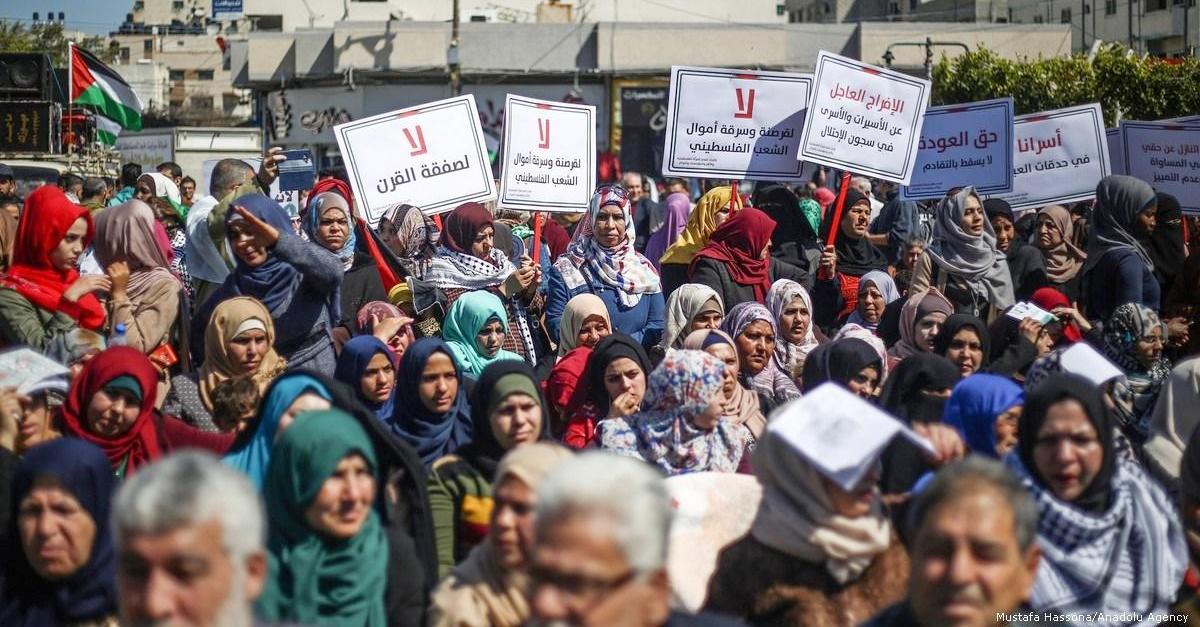
Protest in Gaza City, March 6, 2019, against Trump's "Deal of the
Century."
Palestinian groups, Fatah, Hamas and others should not
confine themselves to merely rejecting the Trump Administration's
so-called 'Deal of the Century.' Instead, they should use their
resistance to the new American-Israeli plot as an opportunity to
unify their ranks.
Leaked details of the 'Deal of the Century' confirm
Palestinians' worst fears: the 'Deal' is but a complete American
acquiescence to the right-wing mentality that has ruled Israel
for over a decade.
 According to the Israeli
daily newspaper, Israel
Hayom,
a demilitarized state, 'New Palestine' will be established on
territorial fragments of the West Bank, as all illegal Jewish
settlements would permanently become part of Israel. If
Palestinians refuse to accept Washington's diktats, according to
the report, they will be punished through economic and political
isolation. According to the Israeli
daily newspaper, Israel
Hayom,
a demilitarized state, 'New Palestine' will be established on
territorial fragments of the West Bank, as all illegal Jewish
settlements would permanently become part of Israel. If
Palestinians refuse to accept Washington's diktats, according to
the report, they will be punished through economic and political
isolation.
This is certainly not an American peace overture, but an
egregious act of bullying. However, it is hardly a deviation from
previous rounds of 'peace-making,' where Washington always took
Israel's side, blamed Palestinians and failed to hold Israel to
account. Washington has never refrained from supporting Israeli
wars against Palestinians or even conditioned its ever-generous
aid packages on the dismantling of the illegal Jewish
settlements.
The only difference between the U.S. 'peace process' of
the
past and today's 'Deal of the Century' is in the style and
tactics as opposed to the substance and details.
Undoubtedly, the 'Deal,' championed by Jared Kushner,
President Donald Trump's adviser and son-in-law, will fail. Not
only will it not deliver peace -- this is not the intention --
but it is most likely to be rejected by Israel. The formation of
Israel's new government under Benjamin Netanyahu's leadership is
centred round far-right and religious parties. It is no longer
politically correct in the new Israeli lexicon to even discuss
the possibility of a Palestinian state, let alone agree to
one.
Netanyahu, however, is likely to wait for Palestinians
to
reject the deal, as they certainly should. Then, with the help of
pro-Israel mainstream western media, a new discourse will evolve,
blaming Palestinians for missing yet another opportunity for
peace, while absolving Israel from any wrongdoing. This pattern
is familiar, highlighted most starkly in Bill Clinton's Camp
David II in 2000 and George W. Bush's Road Map for Peace in
2003.
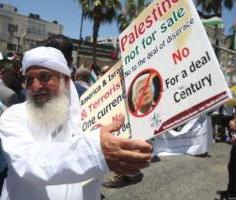 In 2000, the late
Palestinian leader, Yasser Arafat,
rejected
then Israeli Prime Minister, Ehud Barak's 'generous offer,' an
entirely manufactured political hoax that, to this day, defines
official and academic understanding of what had transpired in the
secret talks then. In 2000, the late
Palestinian leader, Yasser Arafat,
rejected
then Israeli Prime Minister, Ehud Barak's 'generous offer,' an
entirely manufactured political hoax that, to this day, defines
official and academic understanding of what had transpired in the
secret talks then.
All Palestinians must reject the 'Deal of the Century,'
or any
deal that is born out of a political discourse which is not
centred on Palestinian rights as enshrined in international law,
a political frame of reference that is agreed upon by every
country in the world, save the U.S. and Israel. Decades of
fraudulent American 'peacemaking' prove that Washington will
never fulfill its self-designated title as an 'honest
peacemaker.'
However, rejection per se, while going back to
business
as usual, is inadequate. While the Palestinian people are united
behind the need to resist the Israeli Occupation, challenge
Israeli apartheid and employ international pressure until Israel
finally relents, Palestinian factions are driven by other selfish
priorities. Each camp seems to rotate within the political sphere
of foreign influence, whether Arab or international.
For example, Fatah, which is credited for 'igniting the
spark
of the Palestinian revolution' in 1965, has been primarily
consumed with the trappings of false power while dominating the
Palestinian Authority, which itself operates within the space
allocated to it by the Israeli military occupation in the West
Bank.
Hamas, which began as an organic movement in Palestine,
is
forced to play regional politics in its desperation for any
political validation to escape the suffocating siege of Gaza.
Whenever both parties verge on forming a united
leadership in
the hope of resurrecting the mostly defunct Palestine Liberation
Organization (PLO), their benefactors manipulate the money and
politics, thus resuming disunity and discord.
The 'Deal of the Century,' however, offers both groups
an
opportunity, as they are united in rejecting the deal and equally
perceive any Palestinian engagement with it as an act of
treason.
More importantly, the steps that were taken by
Washington to
isolate the PA through denying Palestinians urgently needed
funds, revoking the PLO's diplomatic status in Washington and
shunning the PA as a political ally provide the opportunity to
open the political dialogue required that could finally
accomplish a serious Fatah-Hamas reconciliation.
Israel, too, by withholding tax money collected on
behalf of
the PA, has lost its last pressure card against Mahmoud Abbas and
his government in Ramallah.
At this point, there is little else that the U.S. and
Israel
could do to exert more pressure on the Palestinians.
But this political space available for Palestinians to
create
a new political reality will be brief. The moment the 'Deal of
the Century' is discarded as another failed American scheme to
force a Palestinian surrender, the political cards, regionally
and internationally, will be mixed again, beyond the ability of
Palestinian factions to control their outcome.
Therefore, it is critical that Palestinian groups at
home and
in the diaspora push for Palestinian dialogue, not merely for the
sake of forming a unity government in Ramallah but to revitalize
the PLO as a truly representative and democratic body that
includes all Palestinian political currents and communities.
It is only through the resurrection of the PLO that
Palestinians could finally return to their original mission of
devising a national liberation strategy that is not manipulated
by money and not subjected to regional politicking.
If history is any indication, the 'Deal of the Century'
is
another sinister American attempt to manage the situation in
Palestine to assert political dominance in the region. This
'Deal' is essential for American reputation, especially among its
disgruntled regional allies who feel abandoned by the progressive
American military and political retreat from the region.
This latest charade does not have to be at the expense
of
Palestinians, and Palestinian groups should recognize and grasp
this unique opportunity. The 'Deal of the Century' will fail, but
efforts to achieve Palestinian unity could finally succeed.
Ramzy Baroud is a journalist, author and editor of Palestine
Chronicle. His latest book is 'The Last
Earth: A
Palestinian Story' (Pluto Press, London). Baroud has a Ph.D. in
Palestine Studies from the University of Exeter and was a
Non-Resident Scholar at Orfalea Center for Global and
International Studies, University of California Santa Barbara.
His website is www.ramzybaroud.net.

35th Anniversary of Operation Blue Star

Original Akal Takht, Darshani Deori and surrounding
area prior to
Operation Blue Star.
From June 3-8, 1984, 35 years ago, the Indian
government of
Indira Gandhi carried out the devastating assault and massacre of
innocent Sikhs at the Golden Temple complex in Amritsar, Punjab,
known as Operation Blue Star.
The stated aim of Operation Blue Star was to "flush out"
so-called "Religious Terrorists" led by Sant Jarnail Singh
Bhindranwale. Operation Blue Star was carried out in the context
of the concerted action of the Indian and Canadian states to
criminalize the political demands of Sikhs for statehood for
Punjab -- the creation of Khalistan. They labelled the proponents
of this demand "Sikh fundamentalists." By associating Sikhism
with extremism they managed to criminalize Punjabis, including
those who were not religious in any way and especially the youth.
This served as the model for the subsequent targeting of all
people of the Muslim faith and the demand that people prove their
loyalty to the state by demonstrating that they are moderates.
Meanwhile, as in the case of the Sikhs, all Muslims became
targets of violence and the impunity of the state, along with all
others on the basis of communal divisions and identity.

Remnants of the Akal Takht consumed by
fire. Large bullet holes
are visible on the right hand side of the building.
|
The Golden Temple is the holiest site of Sikhs. By
modern
standards the state is not permitted to interfere with a person's
conscience and the practice of their beliefs or the sanctuary of
their own church. The Indian army operation against the Golden
Temple violated the sanctity of a place of worship and
established the precedent that holy places would henceforth no
longer be considered a safe haven from persecution or a refuge
from the action of the state.
The military action, which included tanks, helicopters,
armoured vehicles, artillery and chemical weapons, was timed to
take place on the anniversary of the martyrdom of Guru Arjan Dev
in 1606. Over 70,000 troops were ordered to capture less than 50
men. The military assault occurred under cover of a total media
blackout. Thousands of innocent civilians were killed over five
days.
The storming of the centre of Sikh spiritual and
temporal
authority by the Indian Army under the orders of Indira Gandhi
led immediately to a mutiny in Sikh units of the Army and four
months later, on October 31, to the assassination of Indira
Gandhi by her Sikh bodyguards. Ruthless anti-Sikh pogroms were
unleashed by the Indian state to wreak revenge. Thousands of
innocent Sikhs were beaten and burned alive during the anti-Sikh
pogroms on November 1, 2 and 3. The state-organized anti-Sikh
mobs massacred over 8,000 innocent Sikhs, 3,000 in Delhi
alone.
The police stood by and watched and, in some cases,
actively
participated in the attacks. It is estimated that subsequent
government operations Woodrose, Blackthunder, Night Dominance,
Rakshak I and II, and Final Assault led to the deaths of 25,000
to 80,000 Sikhs.
The government officials who are known to have
instigated,
authorized and organized the violence subsequently enjoyed
promotion, including to cabinet positions and decades of impunity
despite repeated demands for justice.
Speaking a year later in London, England, Hardial Bains
pointed out:
"What has been proven during this year in which the army
has
occupied the Punjab -- the year which began with the invasion of
the Golden Temple, the headquarters of the Sikh religion, and the
indiscriminate massacres which were committed there and all over
Punjab, as well as, shortly after, in Delhi and other places in
the wake of the assassination of Indira Gandhi -- is that the
Indian ruling classes want to create a religious problem, a
communal problem, in order to divert the attention of the people
from their real struggle for national and social liberation.
"At the same time, through their use of communal
violence and
fascist terror, they want to convince the struggling masses that
the ruling classes are 'strong' and will be as ruthless in
smashing the struggle of the people as the situation warrants.
Nonetheless, the Indian ruling classes and their bourgeois
political parties have not been able to accomplish any of their
aims. The pure love and unity which the people of Delhi and other
places exhibited for one another, in which they defended and
sheltered the Sikh people, condemned the bestial hatred and the
rape, looting and murders engineered by the Rajiv Congress under
the watchful eyes of the police forces -- the expression of the
people's unity irrespective of their religion, caste or regional
origin -- brought forth tears of joy amidst the people, while the
bitter news of the communal violence and fascist terror brought
forth anger. This joy, and anger, both so deep, with the anger
seething like a volcano, this response of the people, has driven
the Indian ruling classes into further frenzy and desperation.
The people expressed their real psychology, their love and
affection for one another and for their cause. This has been
ingrained in them, the result of the centuries-long struggle for
real national and social liberation. The Indian ruling classes
miserably failed in their aim of making religion the issue and a
point of division and bestial hatred amongst the people. Even
though Rajiv Gandhi assumed the role of a swaggering Hindu who
accuses others of being 'Sikh fanatics,' 'Naxalite extremists'
and so on, the people in India and the people abroad,
irrespective of their religion, caste or region of origin have
condemned this as an insult to the Indian people and as
abhorrent. They have understood all too well that this has been
nothing but a cover, a ruse, to hide the real enemies, the Indian
ruling classes. They have expressed their profound anger against
this attempt to blame the people for the crimes the ruling
classes themselves commit so as to sow communal strife. Rajiv
Gandhi tried to divert the issue of the just struggle of the
people for their livelihood, for their freedom, and for progress.
This, he claims, overwhelms the government. He passed the
anti-terrorism law and under this law, any struggle, be it of the
workers for their livelihood, or of the peasants for their land,
or of the people for true independence, prosperity and progress,
is liable to overwhelm the government. Thus, all who stand for
these just causes must be put to death, or carted away to the
dungeons and jails. In passing this law, Rajiv Gandhi wants to
kill the Indian revolution and put the Indian people to death or
imprison them for it is only through the revolution that they can
win their rights.

Bodies of Sikhs killed in the assault lie on the
once beautiful covered
marble
parkarma.
|
"Besides failing to make religion the issue over which
the
people are fighting, the Indian ruling classes also failed to
create a climate of compromise and submission. Facing such an
impossible situation, Rajiv Gandhi's draconian law also includes,
besides the threats of death and long-term imprisonment, clauses
which prohibit the Indian people from singing their songs of
revolution, of valour and heroism and which espouse their
determination to put an end to this barbaric rule which has
brought them so much suffering. Under the pretext that this law
is to curb terrorism, the government gives itself the right to
commit any act of terror and, like Aurangzeb who also banned the
playing of instruments and the singing of songs, Rajiv Gandhi has
done the same. Aurangzeb was facing the revolt of the people of
the south and of the northwest and northeast and the ground was
slipping under his feet as well. He too, wearing the gown of a
swaggering Muslim, thought he could kill the revolution and
imprison and put to the sword all the revolutionary forces. In
the same manner, today the Indian ruling classes and Rajiv Gandhi
feel the ground slipping out from under them. This shows the
utter fear that has gripped their hearts. Far from being able to
create an atmosphere of fear, of compromise and submission, it is
the Indian ruling classes which are afraid. It is they who must
further split and divide, and this will further deepen the crisis
and the contradictions will erupt like volcanoes. For their part,
the Indian people know no compromise with their enemies, nor do
they have the tradition of submitting to their native and foreign
exploiters. The entire history of the struggle of the Indian
people for national and social liberation is testimony to
this.
"The Indian people will march on along their road of
national
and social liberation. They have the wisdom and the strength
never to sacrifice their pure love and ancient traditions of
unity and common struggle and to heroically fulfill their age-old
desire to be independent and prosperous. They will never
compromise their pure ideals, nor will they submit to the tanks
and bullets of the enemy. It does not matter how much the Indian
ruling classes try to find and promote those who will agree to
engineer a compromise and create a climate of submission in
Punjab, and it does not matter how much pressure they put on the
people professing the Sikh religion or on the people in Assam,
Kashmir and elsewhere, imposing communal tension and pressure on
the peoples everywhere, or to what extent they carry out communal
violence and fascist terror. The people who could put an end to
Abdalis and Aurangzeb and who never accepted the massacres of
Jalianwala Bagh and of Dum Dum, the heroic people of India who
went to battle with their bare hands against the foreign
occupiers and their native collaborators, this same people will
also send the present ruling classes and their foreign backers
packing. Such is the historical destiny of the doctrine of
supreme sacrifice for the freedom, unity and love for the cause
of the peoples. Such is also the destiny of the oppressors and
traitors whose downfall and overthrow will be the first step
towards the full expression of the real heroism and true ideals
and values which the Indian people hold so precious and dear.
"The joy of struggle and the bitterness of tragedies and
sufferings imposed on the people is their lot today. The victory
of the people's revolution will end this bitterness. It will
create the condition for the proliferation of the real
personality of India, the land of heroes and heroic fighters, the
land where the people value their ideals of freedom more than
their lives, where the millions of hearts are throbbing to put an
end to the curse of division and humiliation, of exploitation and
oppression, the curse which British colonialism imposed on them
and which is now carried out by their collaborators and world
reaction. The victory of the people in this glorious struggle is
guaranteed by their heroism and by their ideals."

75th Anniversary of D-Day

D-Day landing in Normandy, June 6, 1944.
This year marks the 75th anniversary of the World War
II
allied landing on the coast of Normandy, France, on June 6, 1944. On
this anniversary,
Canadians pay deepest respects to all the men and women who
contributed to the defeat of the Nazis in Europe. Nearly 150,000
Allied troops landed or parachuted into the invasion area on
D-Day, including 14,000 Canadians at Juno Beach. The Royal
Canadian Navy contributed 110 ships and 10,000 sailors and the
Royal Canadian Air Force contributed 15 fighter and
fighter-bomber squadrons to the assault. Total Allied casualties that
day reached more than 10,000, including 1,074 Canadians, of
whom 359 were killed.
The invasion force that landed in Normandy on June 6,
1944 was comprised of Americans, British and Canadians. This date known
to history as D-Day, refers to the long-awaited
invasion of northwest Europe to open a Second Front against the
Nazi forces of Adolf Hitler who had occupied France and most of
Europe and had been waging a savage war against the Soviet Union.
To that time, the Soviet Union had borne the brunt of the fight
against Hitler. From 1941 to 1945, the Soviet peoples fought more
than 75 per cent of the German and Axis forces and suffered the
loss during the war, all-told, of more than 20 million
people.
The landing at Normandy is said to be the largest
amphibious
invasion in history. The allies were able to establish a
beachhead as part of Operation Overlord. The First United States
Army attacked on the beaches, code-named "Utah" and "Omaha." The
Second British Army assaulted the beaches, code-named "Gold,"
"Juno" and "Sword" with the Canadians responsible for Juno in the
centre of the British front. The venture was formidable because
the Germans had turned the coastline into a continuous fortress
with guns, pillboxes, wire, mines and other obstacles.
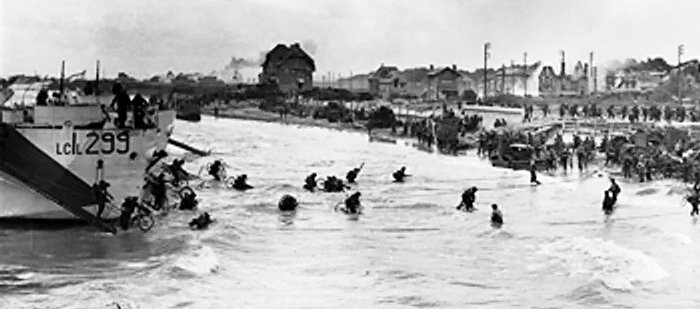
Soldiers of the 9th Canadian Infantry Brigade deploying in the Nan
White
Sector at Juno Beach.
Eleven more months of fighting followed the Normandy
landing
until in May 1945, the Red Army marched into Berlin and the
Germans capitulated. Today May 9 is celebrated as Victory in
Europe Day to honour all those who gave their lives to defeat the
Nazi-fascists.
Historica Canada
points out:
"For years, Soviet leader Joseph Stalin had pressured
the
British and Americans to open another front in the war, by
invading occupied France in the west. In the summer of 1943, the
Allies agreed they were ready to launch the invasion the
following year. American General Dwight Eisenhower was appointed
supreme commander of an amphibious invasion of unprecedented size
and scope, code-named Operation Overlord.
"The Allies needed a French harbour from which to supply
and
sustain a successful invasion force. However, the disastrous 1942
raid on the French port of Dieppe, in which 3,369 Canadians were
killed, wounded or captured, had convinced military planners that
a seaborne assault against a well-defended port was folly.
"In fact, much of the French side of the English Channel
had
been turned into what was called the 'Atlantic Wall' -- mile
after mile of concrete bunkers, machine gun nests, and other
fortifications built by the Germans, overlooking beaches and
tidal estuaries strewn with layers of barbed wire, anti-tank
ditches, mines and other obstacles designed to obstruct an
invading army. [...]"
The Normandy campaign finally ended on August 21, 1944,
with
Canadians playing an important role in closing the Falaise Gap
and assisting in the capture of approximately 150,000 German
soldiers. Now the pursuit of the enemy into the Netherlands,
Belgium and Germany could begin.
Today it is commonplace to hear the Anglo-American and
European imperialists dismiss the feats of the Soviet peoples in
defeating Hitler, while claiming that it was the historic landing
in Normandy on June 6, 1944, which broke Hitler's back. This
makes it possible to claim that the United States played the
decisive role in saving the world from Hitlerism and describing
current U.S. wars of aggression and occupation as wars of
liberation. All U.S. military interventions since the landing at
Normandy are said to oppose dictatorships and tyrannies similar
to Hitler's, thus faithfully following in the tradition of the
landing at Normandy.
This is not the case. The Red Army broke Hitler's back
in
Stalingrad and then chased his Nazi forces all the way back to
Berlin where they were finally forced to surrender. This does not
take away from the fact that the Second Front kept many Nazi
troops engaged and away from the eastern front. German casualties
(killed and wounded) in the Normandy campaign were estimated at
more than 200,000, while the Allies suffered 209,000 casualties
among the more than two million soldiers who landed in France
following the D-Day landing. Among the Allied casualties were
more than 18,700 Canadians, including more than 5,000 soldiers
killed. Had the Anglo-American powers joined the anti-fascist
front called for and established by the Soviet Union under
Stalin, losses caused by the Hitlerite occupation of Europe and
invasion of the Soviet Union would not have been so grave.
Instead they were driven by an aim to make sure they, not the
Soviets, would control the outcome of the war.
On this anniversary, Canadians pay deepest respects to
all the
men and women who contributed to the defeat of the Nazi-fascists
and Japanese militarists in World War II. Their cause for peace,
democracy and freedom is not the same as the cause for which the
U.S. imperialists and big powers wage wars today. Today the fight
to secure peace, freedom and justice requires establishing
anti-war governments and making sure countries are zones for
peace, not war.

- François Lazure -
In an article published on the 70th anniversary of
D-Day,
military historian Benoît Lemay, of the Royal Military College of
Kingston, Ontario pointed out, "There are many misconceptions
about the Normandy landing. It is believed to have enabled the
Allies to win the Second World War. A more nuanced view is
required. In fact, in June 1944, Germany had already lost. The
landing only served to accelerate the end of the war. It was the
Russians on the Eastern Front who did most of the work. For
propaganda reasons, during the Cold War years that followed, the
West would try to minimize the Soviet effort. It would be
conveyed that it was the Allies who did most of the
work."[1]
Lemay explained the motives behind the landing: "In
reality,
the Allies landed in France not only to defeat the Germans, but
also to ensure that Western Europe did not fall under the Soviet
yoke. There was a political aspect and economic
interests."[2]
During their meeting in Tehran at the end of November
1943,
the three leaders -- Stalin, Churchill and Roosevelt -- agreed a
Second Front would be opened. It was the landing in Normandy on
June 6, 1944 that opened this Second Front, in the military
context created by the Red Army, where Germany had already lost
the war because of it and now had to fight on two sides.
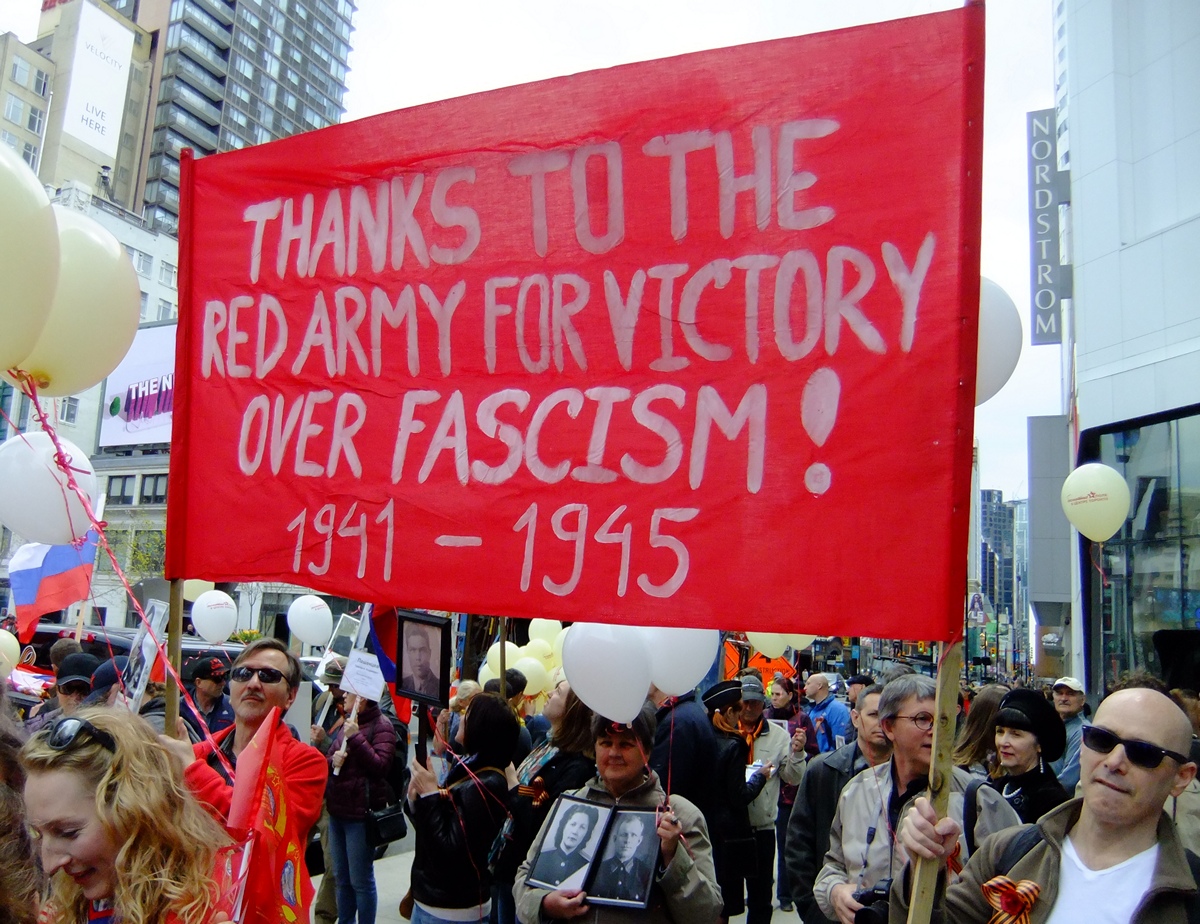
According to the invasion plans, Caen was to be
liberated on
the evening of June 6 but the fighting was so fierce, it was only
finally liberated 40 days later on July 17. The French historian
Claude Quétel explains, "On June 22, 1944, a little more than a
fortnight after the Normandy landings -- and three years to the
day after the invasion of the Soviet Union by the Nazi armies --
Stalin attacked the Hitlerite troops from his side. The
objective: to hold down a maximum of German divisions in the East
to facilitate the progression of the Allies to the West. Stalin
went all out. For this operation, no less than 166 divisions,
1,300,000 men, 5,000 aircraft, 2,700 tanks were mobilized. The
main front is not the one thought to be in Normandy: it was in
the East."[3]
However, Quétel writes, "This Soviet offensive,
the largest
since the beginning of the war, has often been obscured in the
Western world because of the Cold War and rewriting of
history."[4]
Quétel tells us: "The Russian victories in
Stalingrad and
especially Kursk changed the game. The major risk for the
Anglo-Saxons was no longer to see Stalin sign a separate peace
with Hitler, but to see him win the final victory alone! It
became urgent to discuss strategy [...] with the Soviets. The
Tehran Conference brought Churchill, Roosevelt and Stalin
together for the first time in this war."
Historian Antony Beevor summarized what happened a few
days
before the landing in Normandy: "Roosevelt wanted to remind his
subordinates that the Allies were not liberating France to
install General de Gaulle in power." The U.S goal was to "impose
a military government until elections were held," which would
take some time. This is why Roosevelt "insisted on creating an
occupation currency." The disagreements were serious in
Roosevelt's entourage, and "Churchill did his best to persuade
him that they had to work with de Gaulle."[5]
Roosevelt yielded. De Gaulle was
then made aware of the landing that had been planned without his
knowledge in his own country. He learned about it on June 4, the
day before the landing was originally scheduled to take place; it
was postponed a day due to bad weather. The "occupation" of part
of Europe would take place anyway, but without a U.S. "military
government" and its "occupation currency" in France.
In an interview, Beevor expressed the concern of the
Anglo-American Allies with regard to a surrender of Germany only
to the Soviet Union if the disembarkation of their troops was
delayed:
"Eisenhower's decision to launch the operations on June
6,
despite warnings from weather specialists, after a first
postponement on the 5th, was not only a courageous decision, it
was a historic stance. If he had said, 'we postpone the date,'
the next possible window was exactly in the middle of the great
storm of June 19, one of the worst in the [English] Channel. He
would therefore have again had to suspend operations probably
until the spring of 1945. This would have had unimaginable
consequences, not only for the secrecy of the operations and for
the maintenance for a very long time of the armada assembled in
Great Britain, but, especially during this period, the Red Army
would not only have arrived in Berlin, but would have had time to
cross the Rhine and go, why not? all the way to La Rochelle [...]
You can imagine the scene!"[6]
The decisive role of the Soviet Union in the military
defeat
of fascist Germany was accepted by everyone at the time such as
the President of the United States, Franklin D. Roosevelt, who,
even before the landing at Normandy, on May 17, 1944, honoured
the city of Stalingrad declaring:
"In the name of the people of the United States of
America, I
present this scroll to the City of Stalingrad to commemorate our
admiration for its gallant defenders whose courage, fortitude,
and devotion during the siege of September 13, 1942 to January
31, 1943 will inspire forever the hearts of all free people.
Their glorious victory stemmed the tide of invasion and marked
the turning point in the war of the Allied Nations against the
forces of aggression."[7]
Nonetheless, the Anglo-American imperialists like to
claim
that they, not the Soviets, with the invasion of Normandy were
the decisive force in defeating Hitler. The D-Day Commemorations
are used to make this claim and do warmongering propaganda
against Russia today. This does a great disservice not only to
the peoples of the former Soviet Union whose sacrifice in the war
literally saved Europe, but also to the anti-fascist forces in
Britain, the U.S., Canada and the European countries who fought
heroically to do their part in the war. It is done to claim that
wars of aggression and occupation today are for democracy, peace
and freedom which dishonours the anti-fascist contribution of the
soldiers who fought in the Second Front even more.
Notes
1. La Presse, June
6, 2014. Translated from French by TML.
2. Ibid.
3. Le Monde-Hors série:
1944/Débarquements, résistances, libérations,
May-July
2014,
La
bataille de Normandie en neufs points, pp.20-23. Quote
translated from French by TML.
4. Ibid.
5. Antony Beevor, The Second
World War, Little, Brown and Company, New York, 2012.
6. Antony Beevor, "Ce
n'était pas
gagné d'avance," Le Point,
June
5,
2014,
pp.58-62.
Quote
translated
from
French
by
TML.
7. J.V. Stalin, Correspondence
with Franklin D.
Roosevelt and
Harry S. Truman, Vol. 2 (1941-1945), footnote no. 67.

(To access articles individually
click on
the black headline.)
PDF
PREVIOUS
ISSUES | HOME
Website: www.cpcml.ca
Email: editor@cpcml.ca
|

 Cuban Ambassador Josefina
Vidal also spoke at the Ottawa
event. She thanked Pastors for Peace for their support to and
solidarity with the Cuban people throughout all these years, and
underscored that Cubans will never forget the images transmitted
worldwide of Pastors for Peace, led by Lucius Walker, confronting
the heavily armed authorities on the United States-Mexico border.
Likewise, on behalf of the Cuban people, the Cuban diplomat also
thanked the Canadian solidarity movement for always standing by
Cuba.
Cuban Ambassador Josefina
Vidal also spoke at the Ottawa
event. She thanked Pastors for Peace for their support to and
solidarity with the Cuban people throughout all these years, and
underscored that Cubans will never forget the images transmitted
worldwide of Pastors for Peace, led by Lucius Walker, confronting
the heavily armed authorities on the United States-Mexico border.
Likewise, on behalf of the Cuban people, the Cuban diplomat also
thanked the Canadian solidarity movement for always standing by
Cuba.


 According to the Israeli
daily newspaper, Israel
Hayom,
a demilitarized state, 'New Palestine' will be established on
territorial fragments of the West Bank, as all illegal Jewish
settlements would permanently become part of Israel. If
Palestinians refuse to accept Washington's diktats, according to
the report, they will be punished through economic and political
isolation.
According to the Israeli
daily newspaper, Israel
Hayom,
a demilitarized state, 'New Palestine' will be established on
territorial fragments of the West Bank, as all illegal Jewish
settlements would permanently become part of Israel. If
Palestinians refuse to accept Washington's diktats, according to
the report, they will be punished through economic and political
isolation. In 2000, the late
Palestinian leader, Yasser Arafat,
rejected
then Israeli Prime Minister, Ehud Barak's 'generous offer,' an
entirely manufactured political hoax that, to this day, defines
official and academic understanding of what had transpired in the
secret talks then.
In 2000, the late
Palestinian leader, Yasser Arafat,
rejected
then Israeli Prime Minister, Ehud Barak's 'generous offer,' an
entirely manufactured political hoax that, to this day, defines
official and academic understanding of what had transpired in the
secret talks then.

 The spring session of the
Alberta Legislature began May 22 with the
Speech from the Throne delivered by Lieutenant-Governor Lois Mitchell.
Based on the usual claim that the people have spoken and the government
now has a mandate to pay the rich and impose its anti-social agenda,
the Throne Speech declared the election "reflects a
movement towards democratic and economic renewal."
The spring session of the
Alberta Legislature began May 22 with the
Speech from the Throne delivered by Lieutenant-Governor Lois Mitchell.
Based on the usual claim that the people have spoken and the government
now has a mandate to pay the rich and impose its anti-social agenda,
the Throne Speech declared the election "reflects a
movement towards democratic and economic renewal."
 The cartel parties and
governments are put into power and removed
at the bidding of the financial oligarchy, so any talk of democratic
renewal has to begin somewhere other than in their backrooms and press
releases. The working people themselves have to gain power through
their own efforts and organizing, through their own empowerment
and speaking for themselves. Only then can they experience genuine
democratic renewal and march out on a path of economic renewal with a
new motive of production that guarantees the well-being and rights of
the people as a first priority and strives to humanize the social and
natural environment.
The cartel parties and
governments are put into power and removed
at the bidding of the financial oligarchy, so any talk of democratic
renewal has to begin somewhere other than in their backrooms and press
releases. The working people themselves have to gain power through
their own efforts and organizing, through their own empowerment
and speaking for themselves. Only then can they experience genuine
democratic renewal and march out on a path of economic renewal with a
new motive of production that guarantees the well-being and rights of
the people as a first priority and strives to humanize the social and
natural environment.

 Introduced the following
day, May 28, Bill 3 reduces the nominal
corporate tax rate on net enterprise profit from 12 per cent to 8
per cent, becoming the lowest provincial rate in Canada.
Introduced the following
day, May 28, Bill 3 reduces the nominal
corporate tax rate on net enterprise profit from 12 per cent to 8
per cent, becoming the lowest provincial rate in Canada. Another bill, the Appropriation
Act
will provide interim estimates
for public services, to be followed by a full budget in the fall
sitting. The Throne Speech states, "That Budget will be informed
by the report of the Fiscal Review Panel chaired by former
Saskatchewan Finance Minister Janice MacKinnon, which will make
recommendations on how to restore balance to our province's
finances so that we stop encumbering future generations with
debt. My government will also engage in widespread public
consultations on how best to end deficit spending while
protecting front line public services."
Another bill, the Appropriation
Act
will provide interim estimates
for public services, to be followed by a full budget in the fall
sitting. The Throne Speech states, "That Budget will be informed
by the report of the Fiscal Review Panel chaired by former
Saskatchewan Finance Minister Janice MacKinnon, which will make
recommendations on how to restore balance to our province's
finances so that we stop encumbering future generations with
debt. My government will also engage in widespread public
consultations on how best to end deficit spending while
protecting front line public services."
 The UNA asked the Alberta
Labour Relations Board (ALRB)
to
order that the collective bargaining process and arbitration
resume forthwith as required by law and the current collective
agreements. The ALRB responded by announcing an expedited hearing
to take place May 30.
The UNA asked the Alberta
Labour Relations Board (ALRB)
to
order that the collective bargaining process and arbitration
resume forthwith as required by law and the current collective
agreements. The ALRB responded by announcing an expedited hearing
to take place May 30. In an article published by
the School of Public Policy
at the
University of Calgary in 2017, "Putting the Alberta Budget on a
New Trajectory," authors Janice MacKinnon, who just happens to be
the Chairperson of Kenney's "Blue Ribbon Panel" and Jack Mintz,
renowned or rather infamous for his slavish devotion to powerful
private interests, call for wage cuts followed by zero increases
for all Alberta public sector workers. The authors outline the
process for imposing collective agreements, which they insist
will withstand a
In an article published by
the School of Public Policy
at the
University of Calgary in 2017, "Putting the Alberta Budget on a
New Trajectory," authors Janice MacKinnon, who just happens to be
the Chairperson of Kenney's "Blue Ribbon Panel" and Jack Mintz,
renowned or rather infamous for his slavish devotion to powerful
private interests, call for wage cuts followed by zero increases
for all Alberta public sector workers. The authors outline the
process for imposing collective agreements, which they insist
will withstand a 


 To protest continued
mistreatment and abuse, on May 27,
Indigenous peoples and their supporters held actions across the
country which specifically targeted several bills being imposed
on them. They have not been meaningfully consulted on these
bills, which fail to recognize the nation-to-nation relations
that must underpin Canada's relations with the Indigenous
peoples.[
To protest continued
mistreatment and abuse, on May 27,
Indigenous peoples and their supporters held actions across the
country which specifically targeted several bills being imposed
on them. They have not been meaningfully consulted on these
bills, which fail to recognize the nation-to-nation relations
that must underpin Canada's relations with the Indigenous
peoples.[ She added, "These bills
are falsely claiming that
they
will give us more self-government, more self-determination, more
control of our services, more control of our territories. But in
reality, it is lessening and weakening everything that we are
trying to work toward."
She added, "These bills
are falsely claiming that
they
will give us more self-government, more self-determination, more
control of our services, more control of our territories. But in
reality, it is lessening and weakening everything that we are
trying to work toward."















 "BC's proposed amendments
included a permitting regime
for
companies that transport hazardous substances, such as diluted
bitumen, through the province," the press release says.
"BC's proposed amendments
included a permitting regime
for
companies that transport hazardous substances, such as diluted
bitumen, through the province," the press release says.




 Dear Prime Minister Justin
Trudeau,
Dear Prime Minister Justin
Trudeau, CALACS reaches out to and
establishes partnerships with
Latin
American and Caribbean communities, NGOs, research institutions,
and international academics. In addition, our Association works
to inform policy makers, and public and private sector
organizations through its events, publications, communications
media and virtual resources. In so doing, we contribute to
developing strong and long-lasting Canadian networks in Latin
America and in the Caribbean and we promote Canada's image and
influence in the region. In this sense, Canada's failure to
provide visas for Latin American and Caribbean scholars in timely
and respectful fashion can only be understood as a failure.
CALACS reaches out to and
establishes partnerships with
Latin
American and Caribbean communities, NGOs, research institutions,
and international academics. In addition, our Association works
to inform policy makers, and public and private sector
organizations through its events, publications, communications
media and virtual resources. In so doing, we contribute to
developing strong and long-lasting Canadian networks in Latin
America and in the Caribbean and we promote Canada's image and
influence in the region. In this sense, Canada's failure to
provide visas for Latin American and Caribbean scholars in timely
and respectful fashion can only be understood as a failure.






